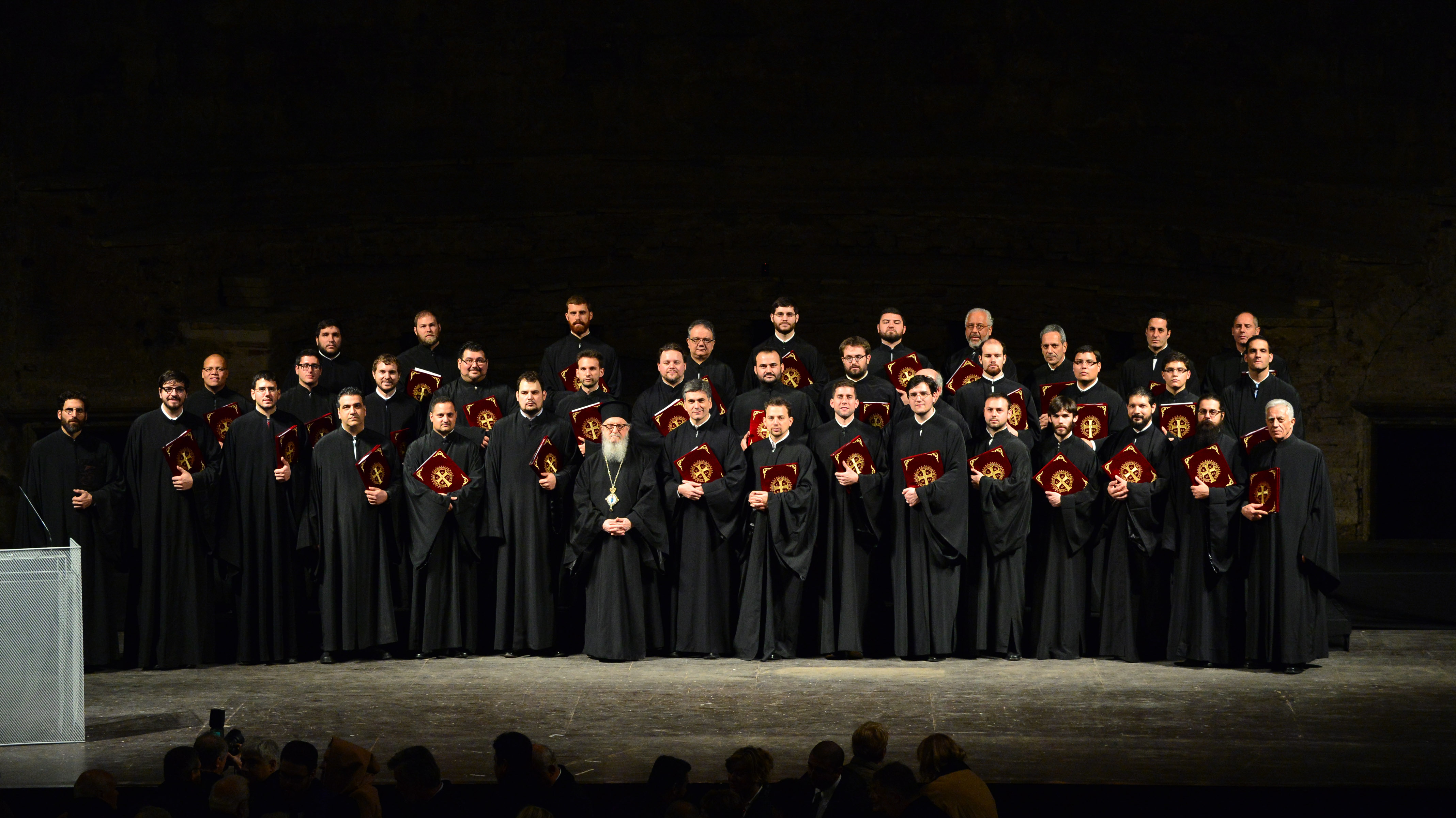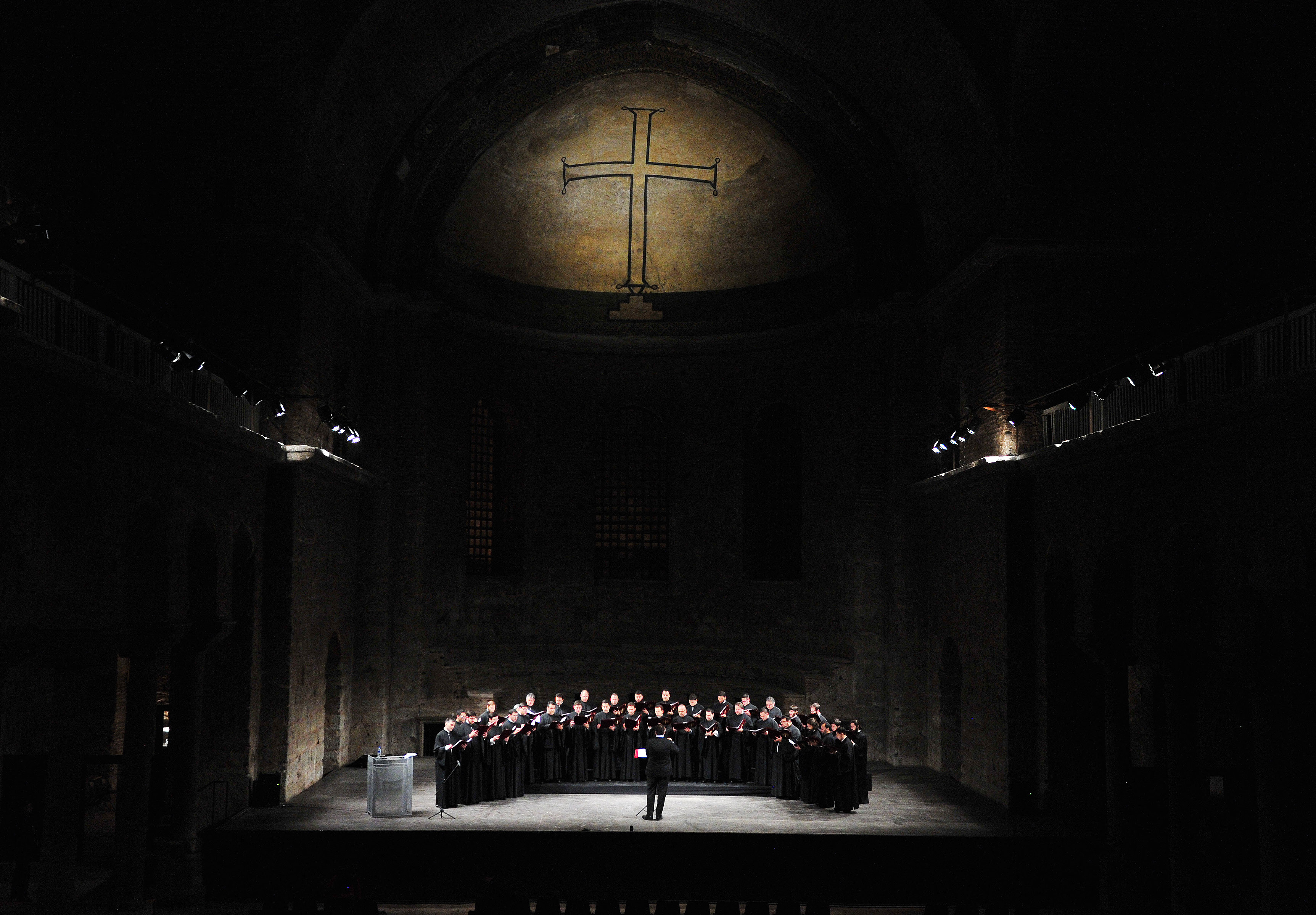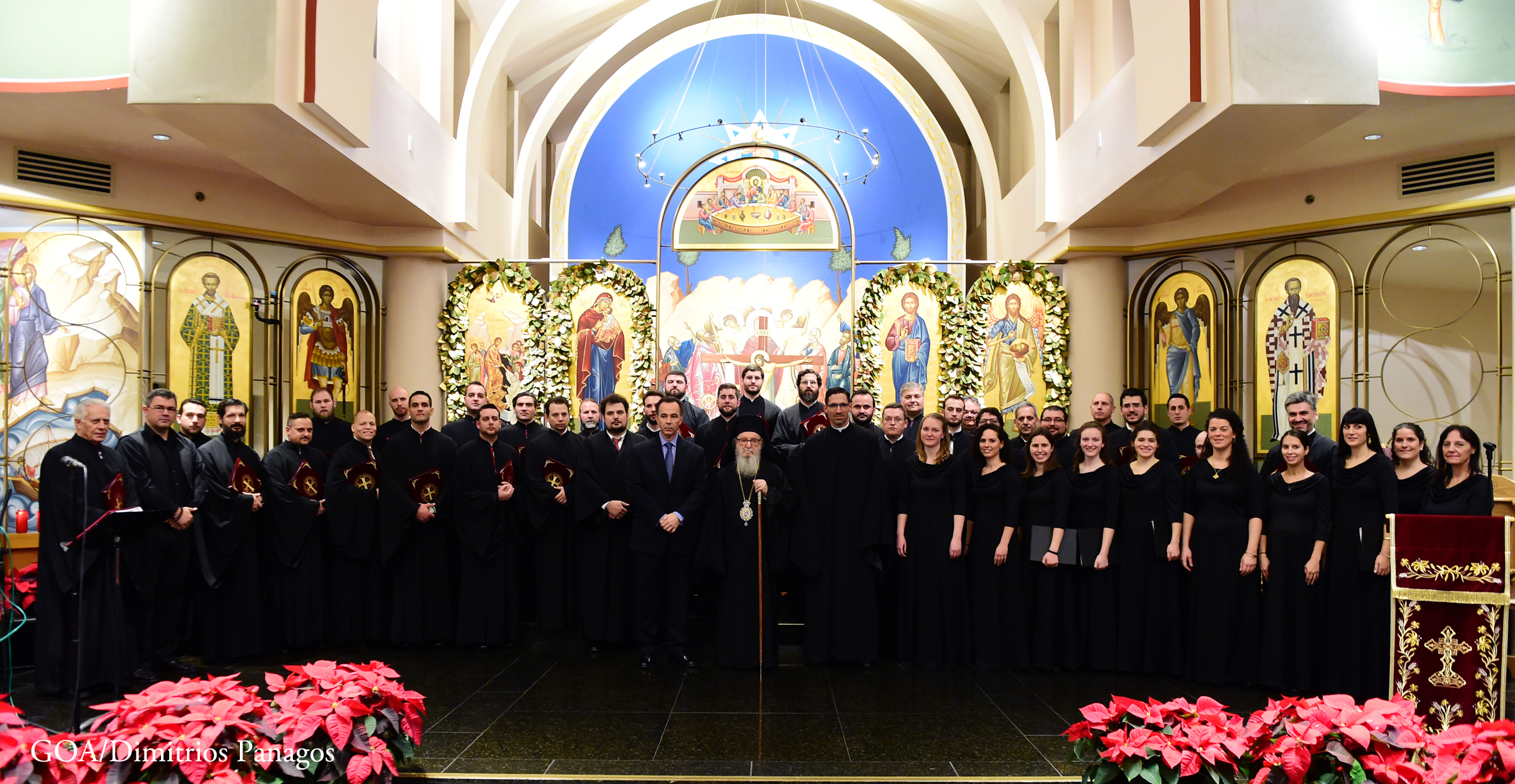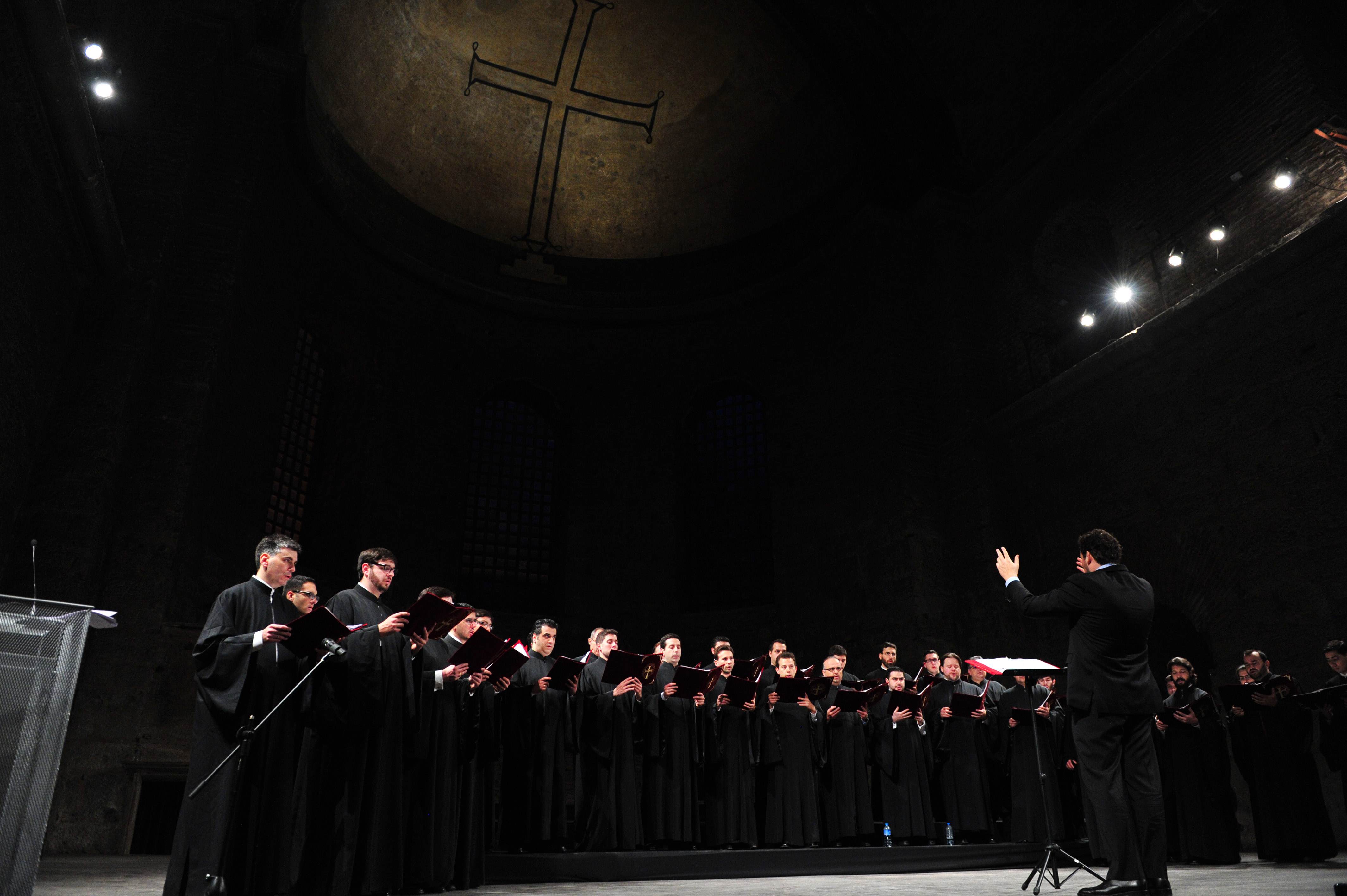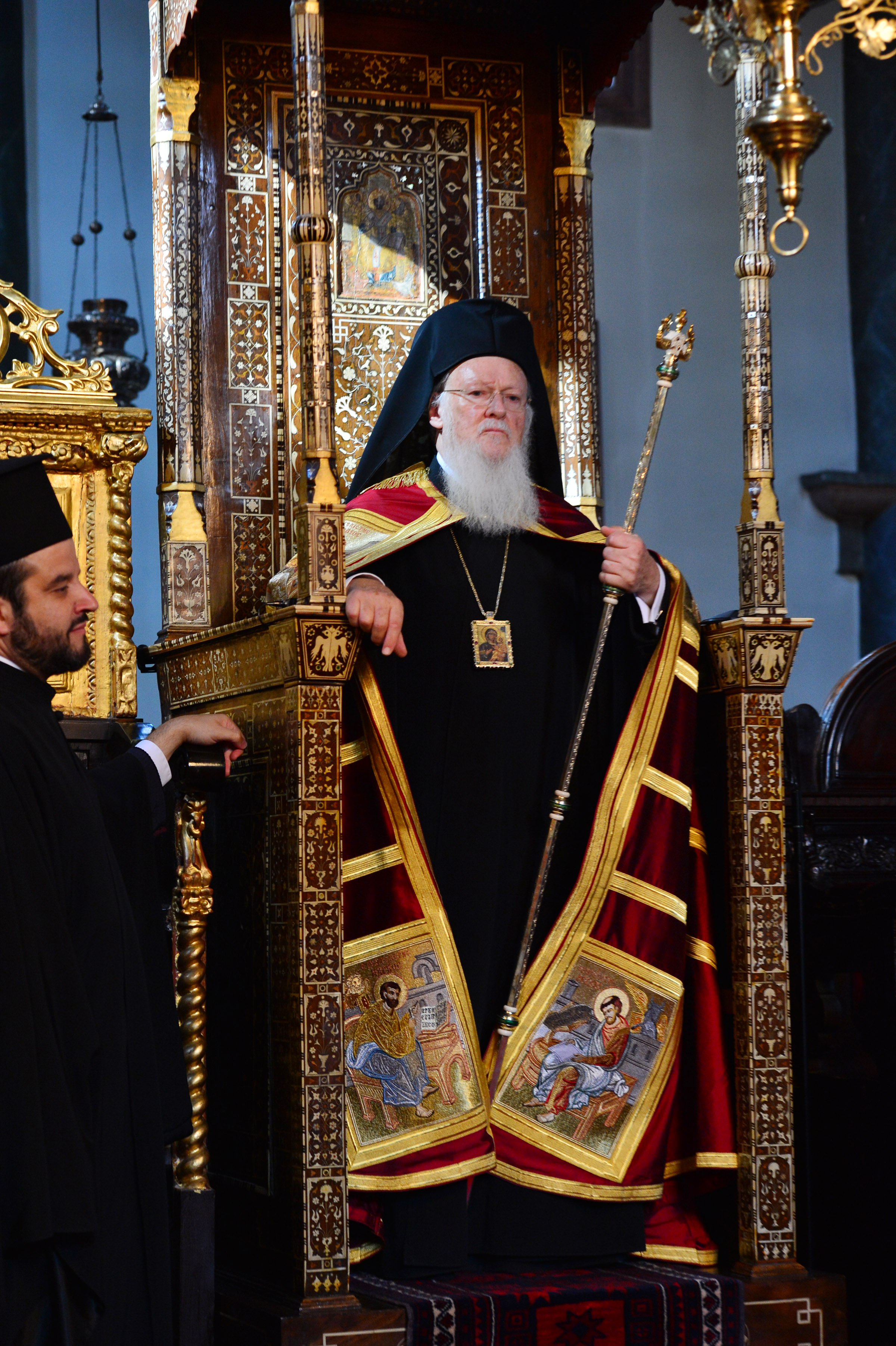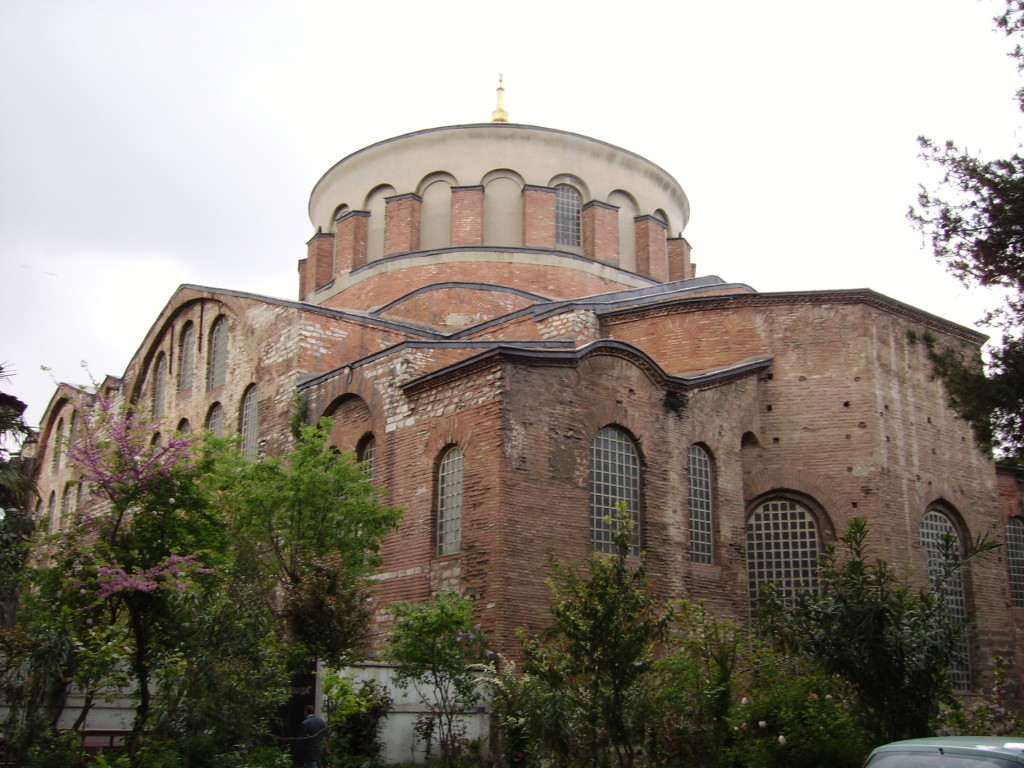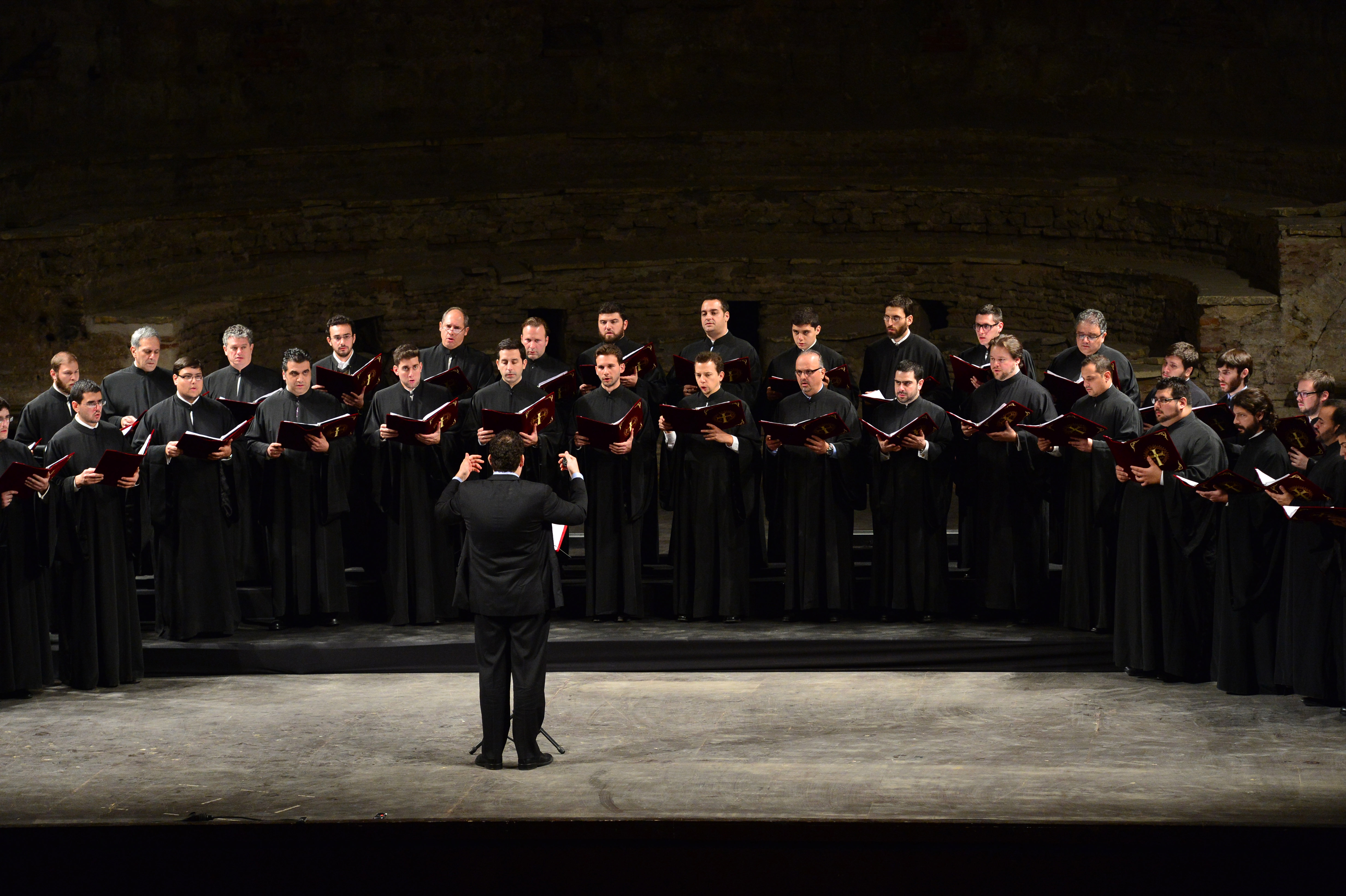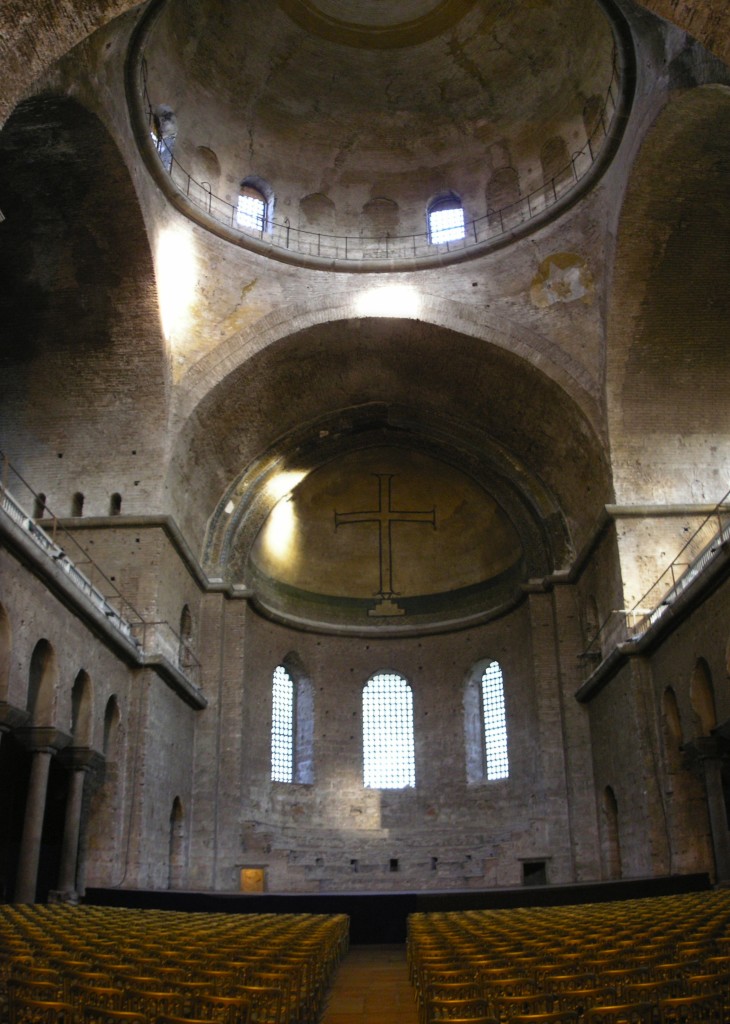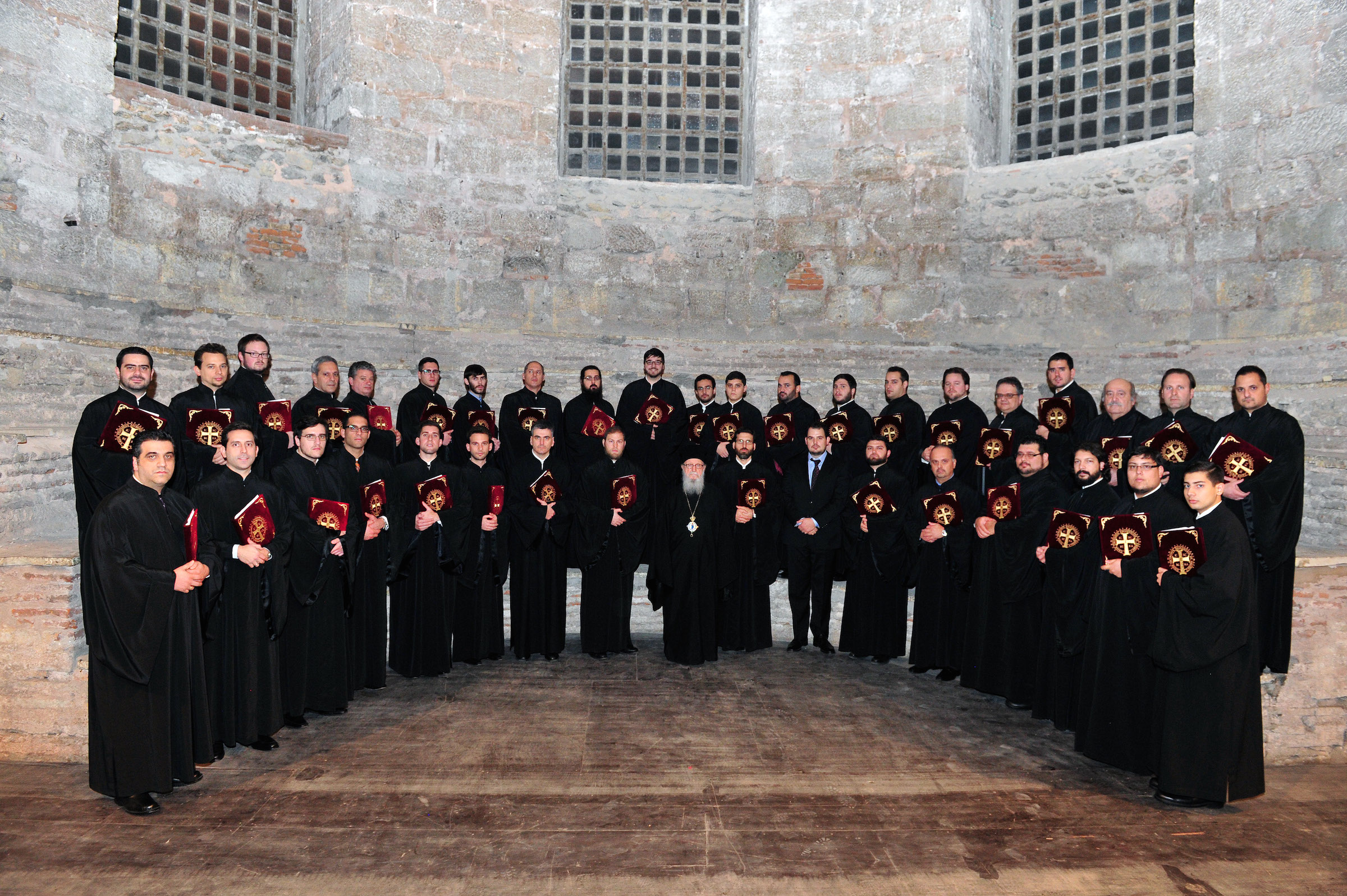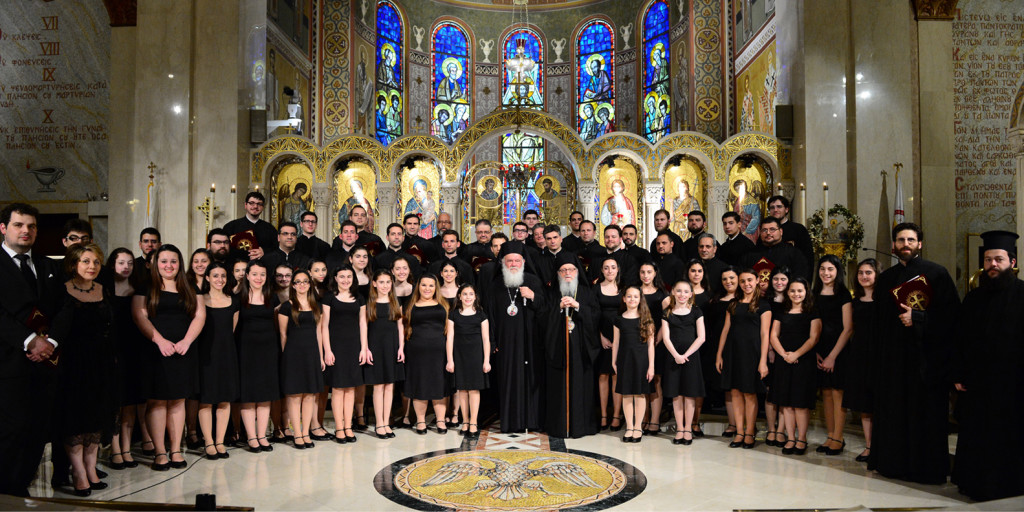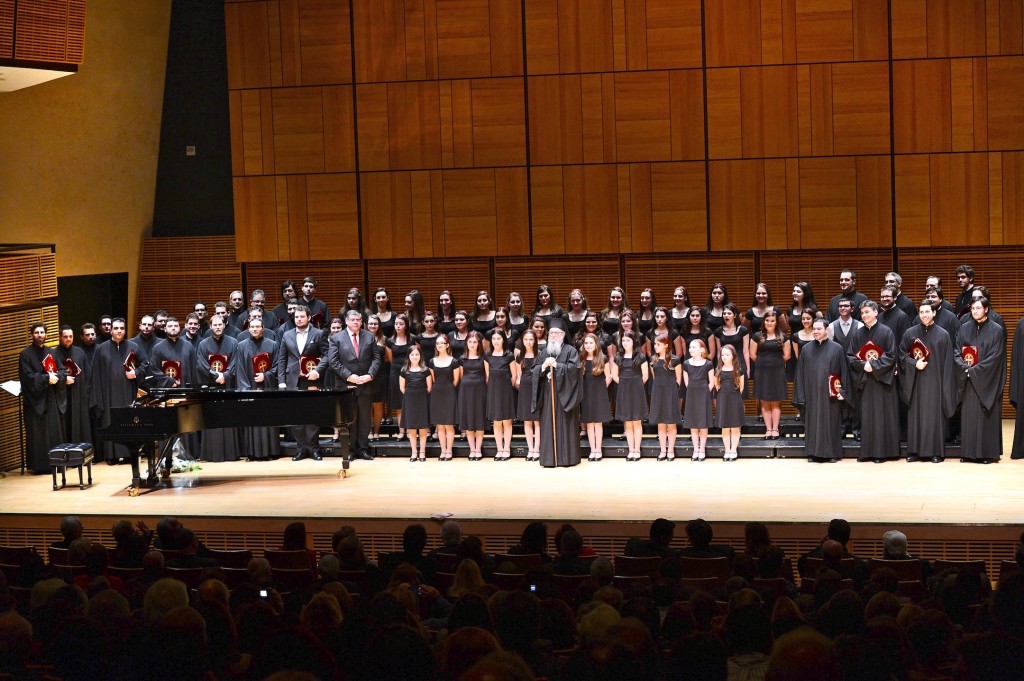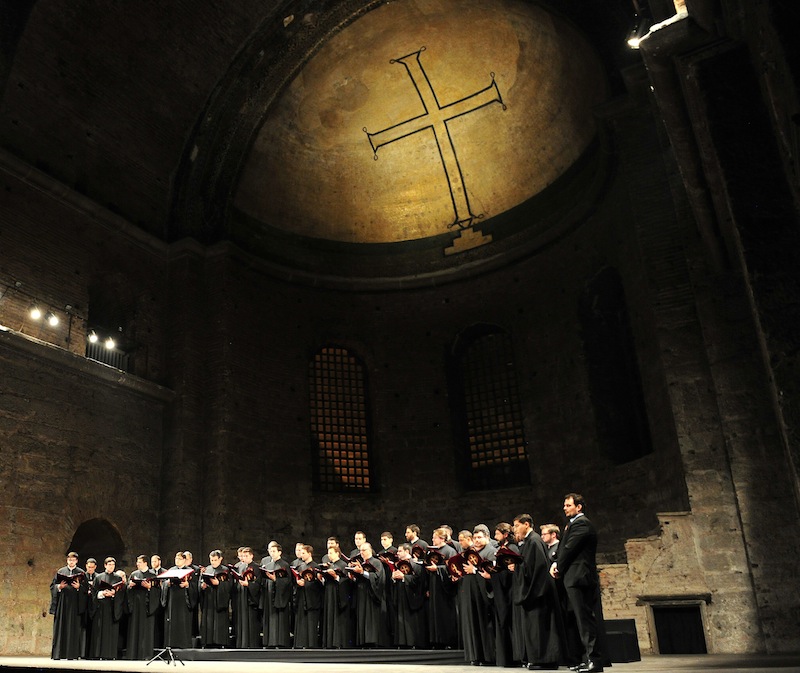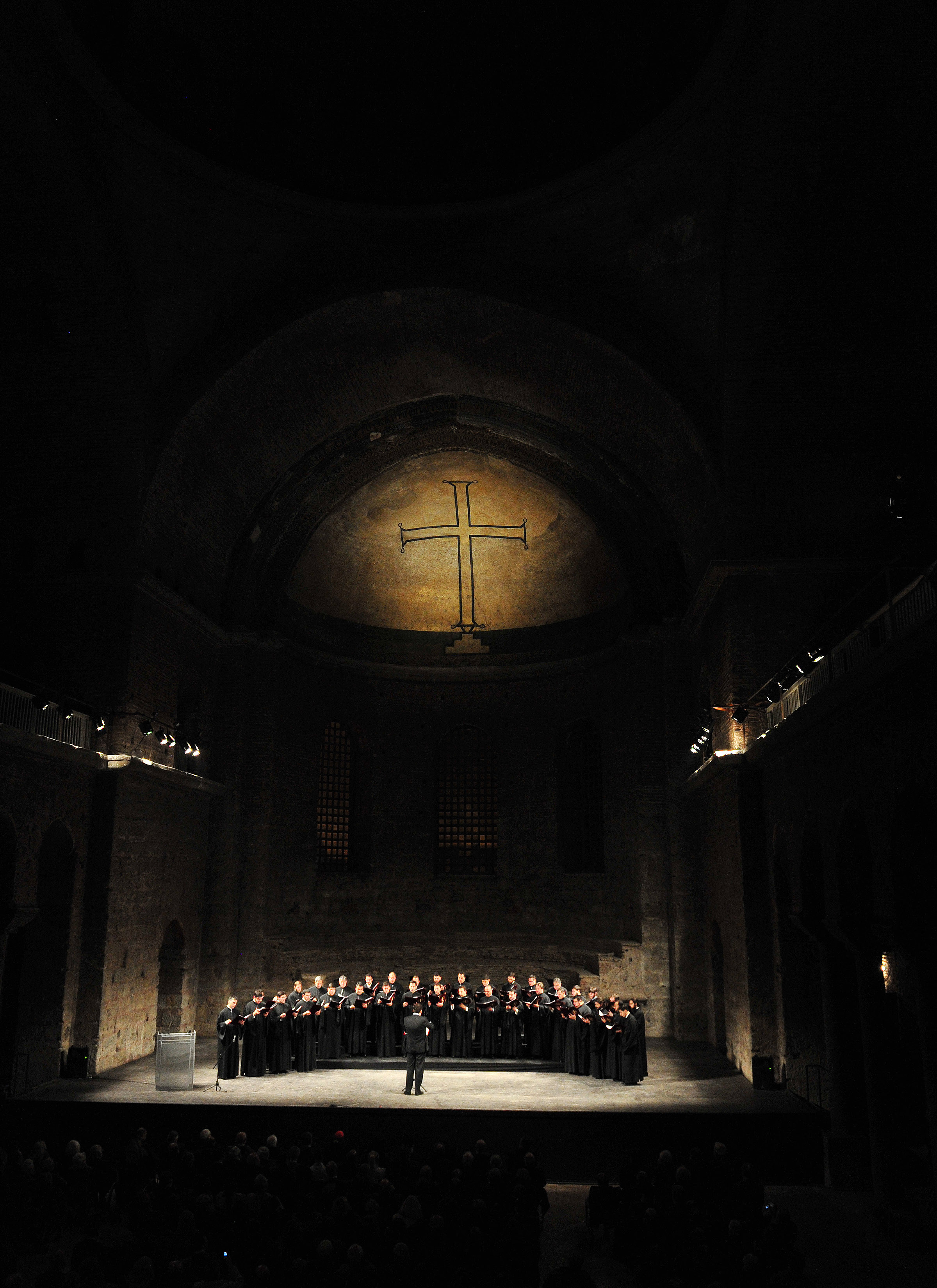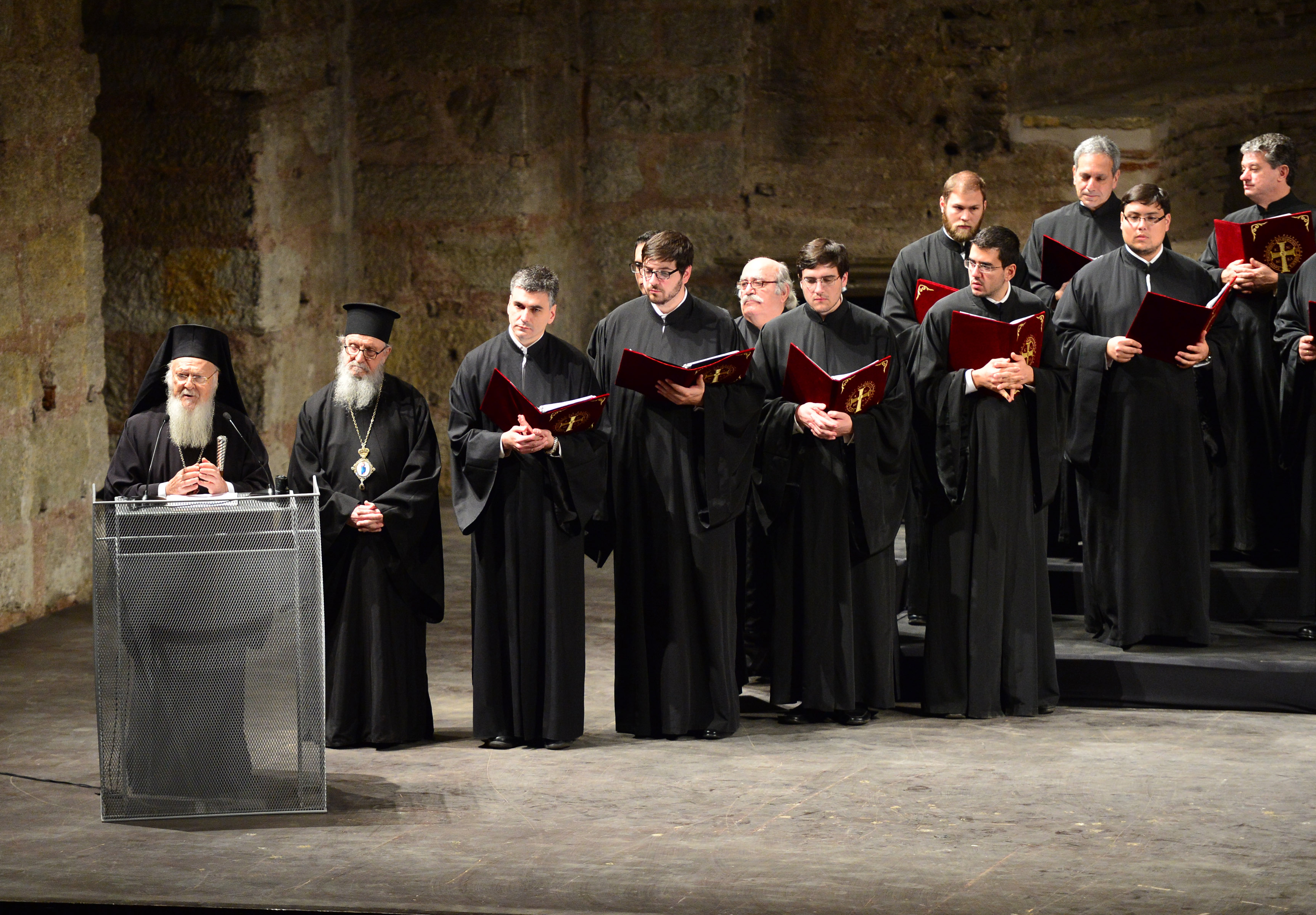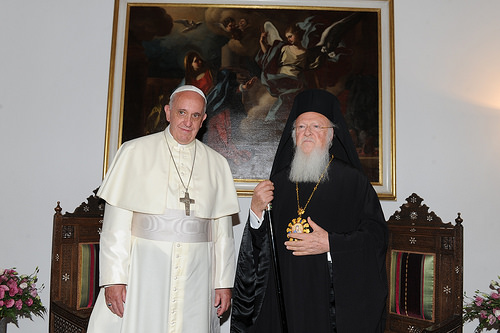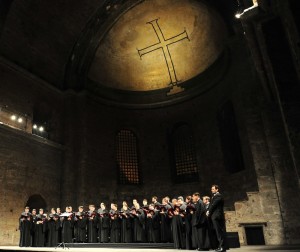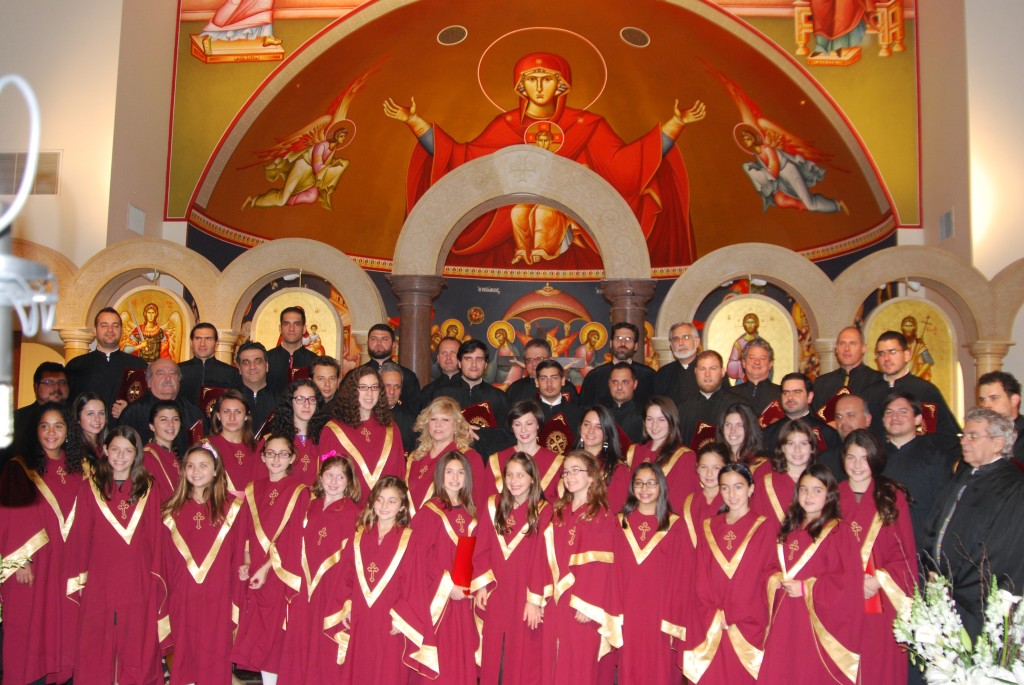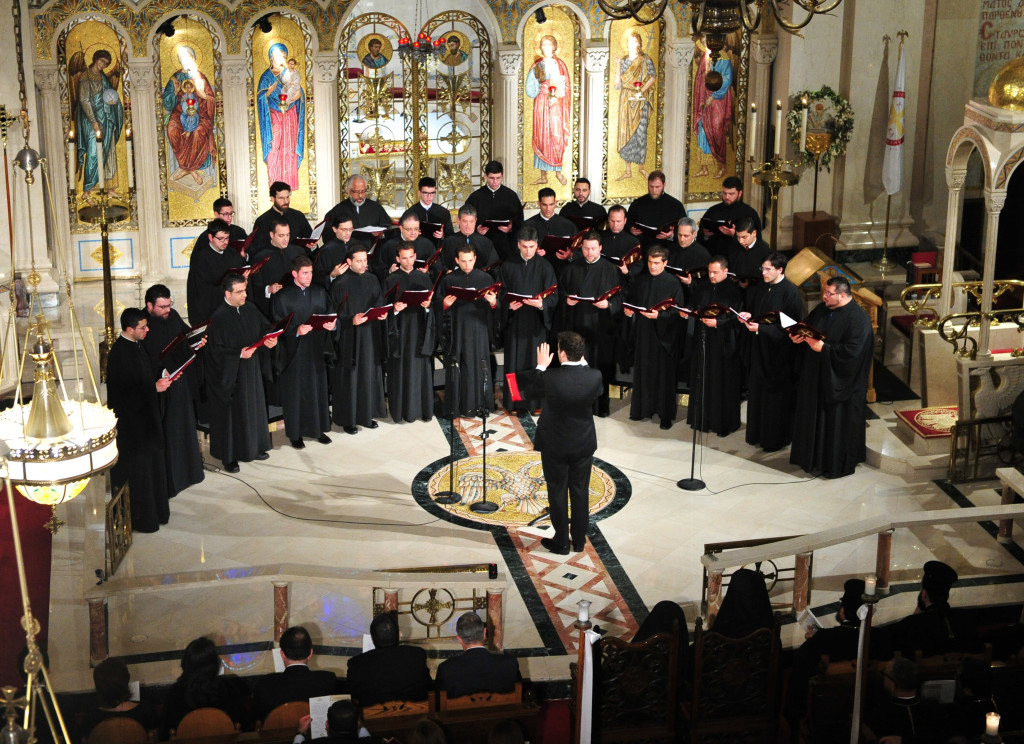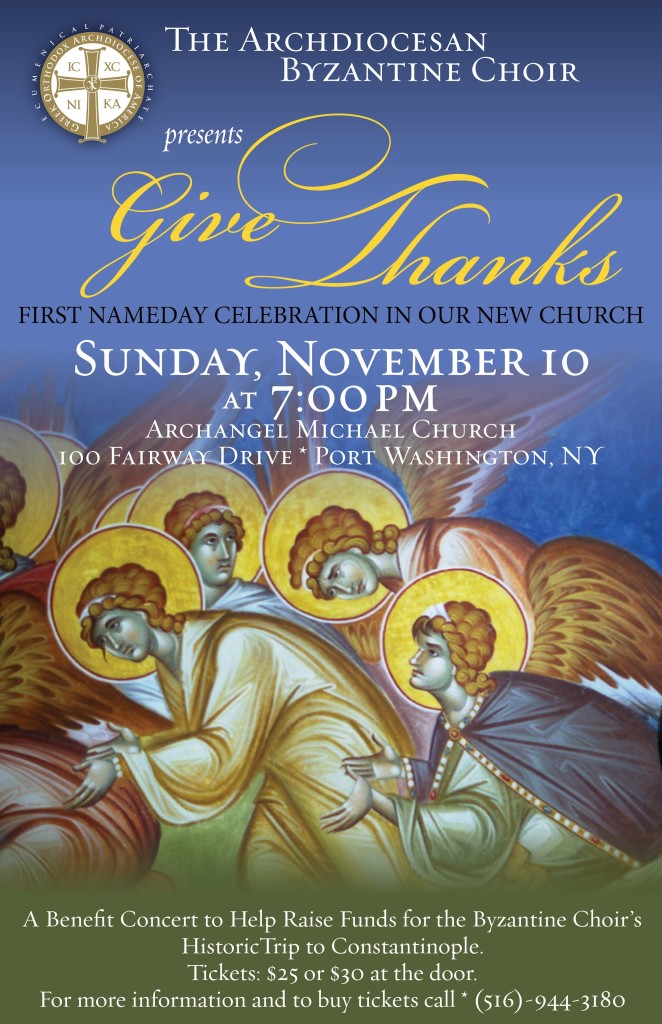Concert: Dormition of the Virgin Mary Church in Southampton
On June 13, at the Dormition of the Virgin Mary Greek Orthodox Church of the Hamptons, the Archdiocesan Byzantine Choir of the Greek Orthodox Archdiocese of America will offer a concert entitled “All Creation Rejoices: Hymns in Honor of the Theotokos!” Formed in 2010 by His Eminence Archbishop Demetrios, the men’s choir has as its primary goal “sharing the beauty of Byzantine Chant beyond the boarders of the Orthodox Church and revealing the spiritual depth of this ancient form of ecclesiastical chant.” The members of the choir are accomplished, formally trained Byzantine chanters, many of whom serve as head chanters in parishes of the Direct Archdiocesan District.
The Concert is presented by His Eminence Archbishop Demetrios of America, who will be in attendance. It is offered free charge and is open to the public. The performance will begin at 6:00 PM and will be followed by a reception. On the following day, Sunday, June 14, the Archdiocesan Byzantine Choir will chant the Archieratical Divine Liturgy in the Church of the Dormition of the Virgin Mary, with His Eminence Archbishop Demetrios as celebrant. Attendees are asked to RSVP by email at info@kimisishamptons.org. The Church is located at 111 St. Andrews Road, Southampton, New York 11968.
Historic Concert in Ancient Church of Hagia Irini
ARCHDIOCESAN BYZANTINE CHOIR RETURNS HOME FROM HISTORIC SECOND
PILGRIMAGE TO THE ECUMENICAL PATRIARCHATE AND
CONCERT IN THE ANCIENT CHURCH OF HAGIA IRINI
NEW YORK, NY— With the blessing of His Eminence Archbishop Demetrios of America, thirty-seven members of the Archdiocesan Byzantine Choir of the Greek Orthodox Archdiocese of America traveled to Constantinople (November 27 – December 1) for the Thronal Feast of the Ecumenical Patriarchate and Feast of St. Andrew the Apostle. This occasion was significant because it also marked the first visit of His Holiness Pope Francis of Rome to the Ecumenical Patriarchate.
After experiencing delays—weather in the United States, computers issues in Turkey— the choir arrived safely in Constantinople the morning of Thanksgiving Day. Weary but eager to take in the sacred sites, the group started by visiting the historic Monastery of the Life-Giving Spring in Balukli to receive holy water and to visit the tombs of the Patriarchs who are buried there; among them is former Archbishop of America and later Ecumenical Patriarch, Athenagoras. From there, the group visited the famous Monastery Church of Chora and took in its architecture and well-known mosaic and fresco iconography. Next, the group visited the Church of Panagia Vlachernon, where the hymn Ti Ypermaho was first chanted. The choir chanted this hymn, and Dr. Grammenos Karanos, Assistant Professor of Byzantine Liturgical Music at Holy Cross Greek Orthodox School of Theology, gave an explanation on the origins of both Ti Ypermaho and the Akathist hymn to which it was originally added. Undaunted, the group continued to the churches of St. Nicholas and St. Haralambos where it met with Fr. Nikolaos of Dionysiou Monastery of Mt. Athos, who is a renowned iconographer and conservator, and expert in Byzantine monuments throughout the Great City. He educated the group on the status of some of the Orthodox Christian communities remaining in Constantinople. Finally, the group reached the hotel, where later that evening all 61 members of the choir’s delegation shared a Thanksgiving Day meal in honor of His Eminence Archbishop Demetrios of America.
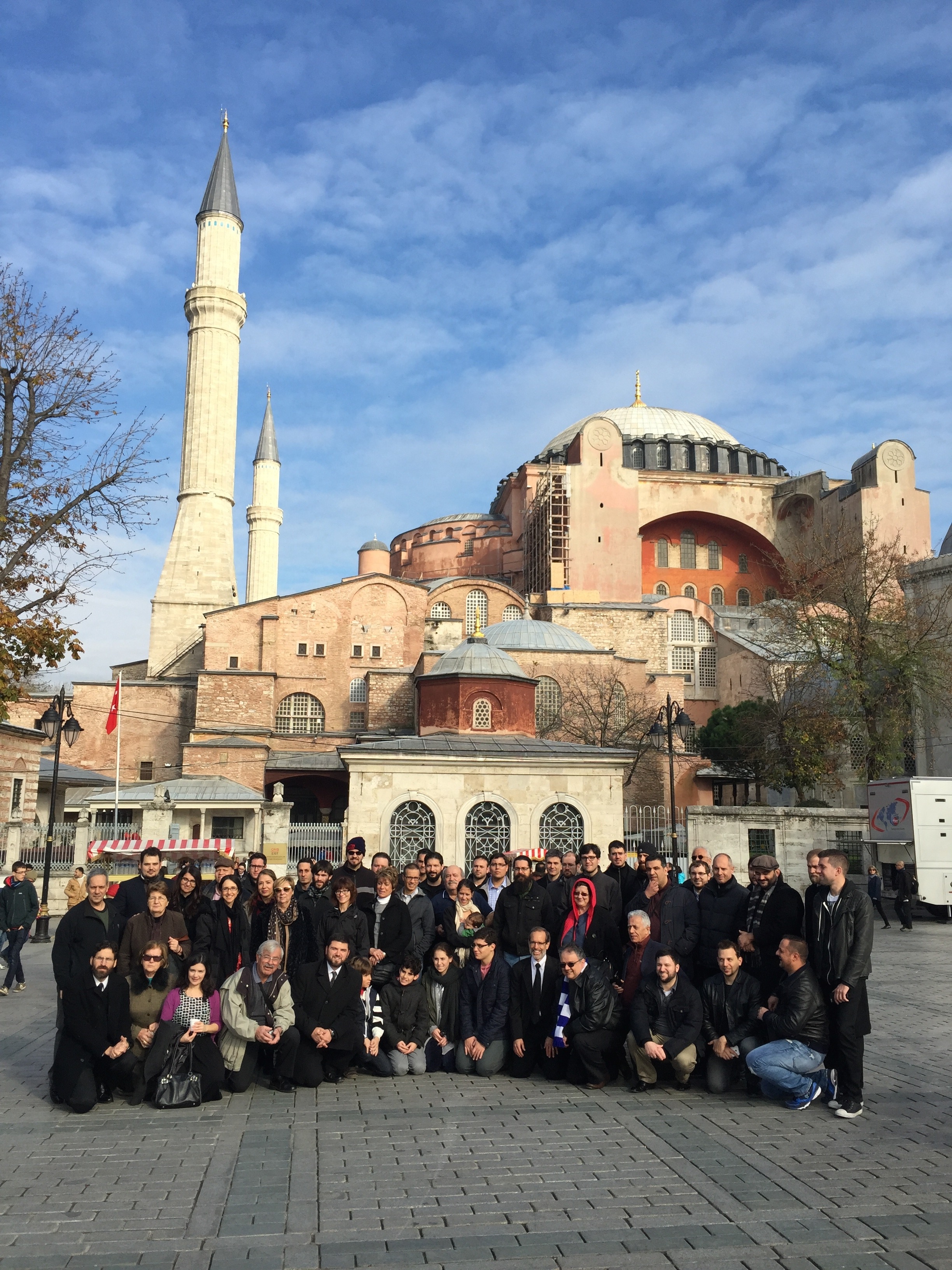 On Friday morning, the choir visited the great edifice erected by the Emperor Justinian, Hagia Sophia (the Church of the Holy Wisdom of God). After a thorough and sobering tour of this great monument and relic of our Church’s living history, the group walked a short distance to the underground cisterns that date to the same era. After a light lunch and a walking tour of the remains of the Hippodrome, the choir made an out-of-the-way stop to a small rug shop in the neighborhood. It was here that the group not only learned about the art of rug-making, but was introduced, three levels below the street, to an ancient agiasma (Holy Spring) that had been discovered when the business owners were doing basement renovations. In this unassuming location survives a faint fresco icon of the Virgin Mary above still-running water. Opposite this spring is the entrance of an ancient church which has yet to be excavated. Fr. Nikolaos of Dionysiou dated the icon to the fourth century, making it perhaps one of the oldest surviving icons in the city. The final activity of this day was to visit the “small Hagia Sophia” church, which currently operates as a mosque, but dates to the sixth century, and was a prototype of the larger Hagia Sophia.
On Friday morning, the choir visited the great edifice erected by the Emperor Justinian, Hagia Sophia (the Church of the Holy Wisdom of God). After a thorough and sobering tour of this great monument and relic of our Church’s living history, the group walked a short distance to the underground cisterns that date to the same era. After a light lunch and a walking tour of the remains of the Hippodrome, the choir made an out-of-the-way stop to a small rug shop in the neighborhood. It was here that the group not only learned about the art of rug-making, but was introduced, three levels below the street, to an ancient agiasma (Holy Spring) that had been discovered when the business owners were doing basement renovations. In this unassuming location survives a faint fresco icon of the Virgin Mary above still-running water. Opposite this spring is the entrance of an ancient church which has yet to be excavated. Fr. Nikolaos of Dionysiou dated the icon to the fourth century, making it perhaps one of the oldest surviving icons in the city. The final activity of this day was to visit the “small Hagia Sophia” church, which currently operates as a mosque, but dates to the sixth century, and was a prototype of the larger Hagia Sophia.
On Saturday November 29th, members of the group visited several sites throughout the city, including the Church of Saint Paraskevi opposite the Patriarchate across the Golden Horn where the tomb of the Neo-martyr Saint Argyro is located as well as the famous Holy Trinity church in Taksim, and the Topkapi Palace. That evening, the group made its way to the Ecumenical Patriarchate for Festal Vespers for St. Andrew the First-called Apostle. Immediately following, the group witnessed the arrival of His Holiness Pope Francis of Rome side-by-side with His All-Holiness Patriarch Bartholomew I of Constantinople and New Rome. The two processed into the nave of the church side-by-side, after having lit candles in the narthex, to the choirs’ chanting of Axion Estin. A Doxology service was chanted, Pope Francis and Ecumenical Patriarch Bartholomew exchanged addresses, and then greeted each other with a kiss of peace, and more than this, Pope Francis asked for the Patriarch to bless him, kissed the Patriarch’s hand, and Patriarch Bartholomew kissed the top of Pope Francis’ head as he did so. Following this historic occasion, the group returned to the hotel for a dinner held in honor of Patriarch Bartholomew hosted by the Archons of the Ecumenical Patriarchate.
The morning of Sunday, November 30th saw the group back at the Patriarchal Church of St. George for Orthros—over which Metropolitan Methodios of Boston presided—and Divine Liturgy presided over by His All-Holiness Ecumenical Patriarch Bartholomew, and concelebrated by other hierarchs of the Holy and Sacred Synod. Pope Francis was in attendance and was seated opposite the Patriarchal throne, with several Latin clerics in attendance with him. Once the faithful had received Holy Communion and the closing prayers of the Divine Liturgy were completed, His All-Holiness once again addressed Pope Francis, in Greek, from the Patriarchal throne, and Pope Francis responded from his seat in Italian. At the completion of their mutual addresses, they descended from their places to meet in the middle of the nave and to embrace one another.
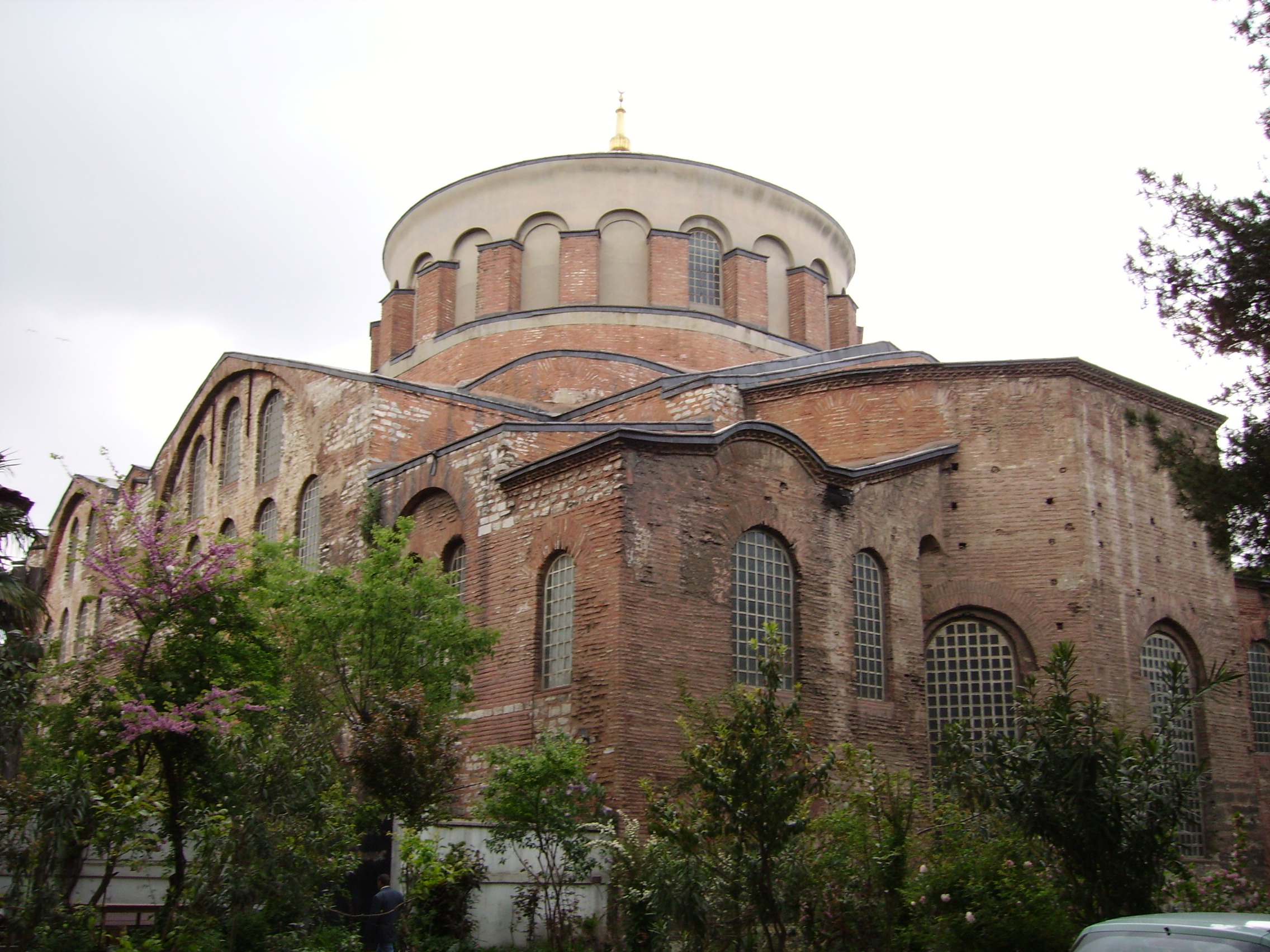 With only a short time to rest, the choir made its way to the historic Hagia Irini church, which is located adjacent to Hagia Sophia. The church, one of the few not to be converted to a mosque by the Ottomans and later Turkish state, now functions as a concert hall. Though its current condition leaves much to be desired, its solid, ancient walls rejoiced as holy Orthodox hymns shook them once more—if only for an hour.
With only a short time to rest, the choir made its way to the historic Hagia Irini church, which is located adjacent to Hagia Sophia. The church, one of the few not to be converted to a mosque by the Ottomans and later Turkish state, now functions as a concert hall. Though its current condition leaves much to be desired, its solid, ancient walls rejoiced as holy Orthodox hymns shook them once more—if only for an hour.
With more than 400 people in attendance, the Archdiocesan Byzantine Choir, under the direction of Dr. Demetrios Kehagias, ascended the steps to the altar-turned-stage, chanting the beloved hymn, Ti Ypermaho. The program included musical selections that were first heard within the Great Imperial City of Constantinople beginning with pieces composed by Petros the Peloponnesian, Lampadarios of the Great Church of Christ and arguably greatest post-Byzantine ecclesiastical composer.
Commenting on the historical significance of the concert, Archdeacon Panteleimon Papadopoulos, managing director of the Archdiocesan Byzantine Choir, said, “without exaggeration, this second concert in Hagia Irini constitutes a tremendous blessing from God especially as it seals the historic meeting between Pope Francis and Ecumenical Patriarch Bartholomew, a meeting of peace and reconciliation. To be in the church of Hagia Irini, a church that was never converted into a mosque, and to chant hymns from our ecclesiastical tradition in praise of our Lord and in honor of His All-Holiness Ecumenical Patriarch Bartholomew whom we not only love, but know very well the conditions and pressures of his patriarchal ministry, is profoundly humbling. I know that I speak for all the people who joined our choir on this trip when I say that we all felt a great amount of gratitude to God for bestowing upon us this great blessing to perform, or should I say pray in Hagia Irini. The choir members have expressed to me that, ‘this is city and its holy treasures are inexhaustible. No one can understand who they are, and what being an Orthodox Christian means unless they visit the Patriarchate and the Great Churches of Constantinople.’”
After the concert, the choir, along with the Archons of the Ecumenical Patriarchate, joined His Eminence Archbishop Demetrios of America for a farewell dinner in the Mega Revma neighborhood on the Bosphoros.
On Monday, December 1, the group boarded its return flight to the United States and arrived home safely.
The members of the choir that performed were: Dr. Demetrios Kehagias, Director, Rev. Fr. Aristidis Garinis, Rev. Fr. Demetrios Kazakis, Archd. Panteleimon Papadopoulos, Rev. Dn. Eleftherios Constantine, Professor Grammenos Karanos, Nektarios Antoniou, Yorgi Argarun, John Boyer, Luis Camacho, Gabriel Cremeens, George Giavris, Aaron Gilbert, Nicholas Gregoriades, Andreas Houpos, Antonios Kehagias, Athanasios Koukoulis, Nicholas Mavromoustakos, Michael Mercado, Athanasios Minetos, Anastasios Mirisis, Michael Odegaard, Dimosthenis Papaioannou, Fotis Papiris, Nicholas Paros, George Petrides, George Psevdos, Peter Romanovsky, Nicholas Roumas, Neofitos Sarigiannis, John Spanos, Christos Stavropoulos, Christos Stroubakos, Apostolos Theodoropoulos, Charleton Trumppower, James Tsimis, Chris Vitelas, Haralambos Zaharis.
Article by : Andreas Houpos, Member of the Archdiocesan Byzantine Choir
To see photos click here:
https://www.flickr.com/photos/goabyzantinemusic/sets/72157649299011459/
For the Remarks of the His-Holiness Ecumenical Patriarch Bartholomew Click Here.
Click here to view the Video of Concert.
Read more...Archdiocesan Byzantine Choir to perform in the Historic Church of Saint Nicholas in Bari, Italy.
[pl_tabs][pl_tabtitlesection type=”tabs”][pl_tabtitle active=”yes” number=”1″]The Concert[/pl_tabtitle][pl_tabtitle number=”2″]Ecumenical Patriarchate[/pl_tabtitle][pl_tabtitle number=”3″]Hagia Irini[/pl_tabtitle][pl_tabtitle number=”4″] Our Choir[/pl_tabtitle][pl_tabtitle number=”5″]Sponsorship[/pl_tabtitle][/pl_tabtitlesection]
[pl_tabcontentsection][pl_tabcontent active=”yes” number=”1″]
All Photos by D. Panagos
HISTORIC MEETING
BETWEEN POPE FRANCIS AND ECUMENICAL PATRIARCH BARTHOLOMEW
The Archdiocesan Byzantine Choir of the Greek Orthodox Archdiocese of America was founded in 2010 with the blessing of His Eminence Archbishop Demetrios of America to promote and share the sacred art of Byzantine music throughout the Archdiocese and beyond. However, this year will be marked in a special way for our choir. For the first time, we will witness the historic meeting between Pope Francis and Ecumenical Patriarch Bartholomew in Constantinople during the great feast of St. Andrew, the First-Called Apostle on November 29-30, 2014. Our choir has been bestowed the great privilege to seal this historic meeting with a concert in honor of these two modern Apostolic Peacemakers. In order to make this historic event possible and help us realize our dream, we need your help!
This year we chose to fundraise by producing an COMMEMORATIVE ALBUM which will be published at the conclusion of the trip. Because we honor and respect the support that you will give us as we make preparations for this historic concert, and also feel an obligation to give back to all of our supporters, the vision for this album is that it will contain pictures and highlights from the festivities taking place in Constantinople, as well as pages which will highlight YOU, our supporters and benefactors, along with your businesses. This will be a publication we feel will become a cherished historical item, preserving in print both the details of the visit and your contributions towards making this once-in-a-lifetime event a reality.
We therefore, take this opportunity to humbly ask for your support to make this trip possible and showcase to the world not only the beauty and grandeur of Byzantine music, but what we as Greek-Americans and Greek Orthodox faithful living on the other side of the Atlantic, thousands of miles from Greece and other traditional centers of orthodoxy, can do and offer to others, to our church and to our world. I am asking you to strongly consider supporting this historic visit and performance of our choir by becoming a sponsor. Not only will your contribution help the members of the choir achieve their goal to raise $100,000 but more importantly you will be part of this historic event, and will be remembered for honoring our Ecumenical Patriarchate, our Archdiocese here in America, and of our Orthodox Christian Faith.
On behalf of His Eminence Archbishop Demetrios of America and all the members of the Archdiocesan Byzantine Choir, and with profound gratitude to God, I wish to thank you for your consideration to become a sponsor and supporter of our choir.
With love in Christ,
Archdeacon Panteleimon Papadopoulos
Director, Archdiocesan School of Byzantine Music
Click here to complete the
COMMEMORATIVE ALBUM SPONSORSHIP FORM
To view the video of last year’s concert in Hagia Irini click here https://www.youtube.com/watch?v=5sOd5guED2s.
To view Photos from last year’s Concert Click here!
To view the official website of the meeting of Pope Francis and Ecumenical Patriarch Bartholomew in Jerusalem in May 2014, visit www.apostolicpilgrimage.org.
[/pl_tabcontent]
[pl_tabcontent number=”2″]About Saint Nicholas Greek Orthodox Church and National Shrine at the World Trade Center
The Ecumenical Patriarchate is the highest see and holiest center of the Orthodox Christian Church throughout the world. It is an institution with a history spanning seventeen centuries, during which it retained its see in Constantinople (present-day Istanbul). It constitutes the center of all the local Orthodox Churches, heading these not by administration but by virtue of its primacy in the ministry of pan-Orthodox unity and the coordination of the activity of the whole of Orthodoxy.
The function of the Ecumenical Patriarchate as center par excellence of the life of the entire Orthodox world emanates from its centuries-old ministry in the witness, protection and outreach of the Orthodox faith. The Ecumenical Patriarchate therefore possesses a supra-national and supra-regional character. From this lofty consciousness and responsibility for the people of Christ, regardless of race and language, were born the new regional Churches of the East, from the Caspian to the Baltic, and from the Balkans to Central Europe. This activity today extends to the Far East, to America and Australia.
Orthodox Christians on all continents, which do not fall under the jurisdiction of the autocephalous (independent) or autonomous (semi-independent) Churches, fall under the direct jurisdiction of the Ecumenical Patriarchate. The most important of the autocephalous Churches are the ancient Patriarchates of Alexandria, Antioch and Jerusalem (together with the ancient Archdiocese of Mt. Sinai), the Patriarchates of Russia, Serbia, Romania, Bulgaria and Georgia, as well as the Churches of Cyprus, Greece, Poland, Albania, and the Church of the Czech Lands and Slovakia. The Autonomous Churches include those of Finland and of Estonia. Consequently, the Orthodox Churches in Europe, America, Australia and Britain, which are not under the jurisdiction of the aforementioned autocephalous Churches, lie within the jurisdiction of the Ecumenical Patriarchate. All Orthodox feel that they are constituents of one essentially spiritual community, wherein “when one member suffers, so do all.” It is a true sense of unity in diversity.
For more information about the Ecumenical Patriarchate click here.
[/pl_tabcontent]
[pl_tabcontent number=”3″]
About Hagia Irini
Naming
The church was dedicated by Constantine to the peace of God, and is one of the three shrines which the Emperor devoted to God’s attributes, together with Hagia Sophia (Wisdom) and Hagia Dynamis (Force). It is also one of the Byzantine Churches that has never been converted into a mosque.
Church
The building reputedly stands on the site of a pre-Christian temple. It ranks, in fact, as the first church built in Constantinople. Roman emperor Constantine I commissioned the first Hagia Irene church in the 4th century. From May to July 381 the First Council of Constantinople took place in the church. It was burned down during the Nika revolt in 532. Emperor Justinian I had the church restored in 548. It served as the church of the Patriarchate before Hagia Sophia was completed in 360.
Heavily damaged by an earthquake in the 8th century, it dates in its present form largely from the repairs made at that time. The Emperor Constantine V ordered the restorations and had its interior decorated with mosaics and frescoes. Hagia Irene is the only example of a Byzantine church in the city which retains its original atrium. A great cross in the half-dome above the main narthex, where the image of the Pantocrator or Theotokos was usually placed in Byzantine tradition, is a unique vestige of the Iconoclastic art; presumably it replaced earlier decoration. The church was enlarged during the 11th and 12th centuries.
The church measures 100 m × 32 m. It has the typical form of a Roman basilica, consisting of a nave and two aisles, divided by columns and pillars. It comprises a main space, a narthex, galleries and an atrium. The dome is 15m wide and 35m high and has twenty windows.
Arsenal
After the conquest of Constantinople in 1453 by Mehmed II, the church was enclosed inside the walls of the Topkapi palace. The Janissaries used the church as an armoury. It was also used as a warehouse for war booty. During the reign of Sultan Ahmet III (1703–1730) it was converted into a weapons museum.
In 1846, Marshal of the Imperial Arsenal, Ahmed Fethi Paşa, made the church into a military antiques museum.[3] It was used as the Military Museum from 1908 until 1978 when it was turned over to the Ministry of Culture.
Concert Hall
Today, the museum serves mainly as a concert hall for classical music performances, due to its extraordinary acoustic characteristics and impressive atmosphere.
[/pl_tabcontent]
[pl_tabcontent number=”4″]
Our Choir
The Archdiocesan Byzantine Choir
Shortly after the formation of the Archdiocesan School of Music in October 2010, His Eminence Archbishop Demetrios of America expressed a desire for the formation of a choir to promote the rich Byzantine musical heritage of the Orthodox Church. The Archbishop’s vision became a reality under the leadership and organiation of Archdeacon Panteleimon Papadopoulos who observed the musical talent of chanters in the Direct Archdiocesan District and established the Archdiocesan Byzantine Choir in December 2010 as a ministry of the Archdiocese.
The talented members of the choir consist of Greek American clergy and young men whose ages range from 16 to 40. The majority of the choir members are established head-chanters (protopsaltis) in churches from within the Direct Archdiocesan District. All members of the choir have had formal training in Byzantine Music while some have even received advanced degrees in Byzantine Music from conservatories in Athens and Thessaloniki.
The choir enjoys a broad programmatic reputation and ecclesiastical repertoire with performances in various venues such as universities, churches and recital halls of NYC. Its primary mission is to share the beauty of Byzantine Music beyond the borders of Orthodox Churches and reveal the spiritual depth of this ancient form of ecclesiastical chant.
Since its inception, the choir has been directed by Demetrios Kehagias. Born in Queens NY, Mr. Kehagias began studying Byzantine Music at the age of 14 under the tutelage of Archon Protopsaltis of the Greek Orthodox Archdiocese of America, Mr. Nikolaos Steliaros. Among his top students in musical theory and application, Mr. Kehagias advanced swiftly and, at age 20, obtained the Certificate of Chant with highest distinction from the National Conservatory of Athens.
Thereafter, Mr. Kehagias was appointed Protopsaltis at St. Demetrios Cathedral of Astoria, NY, the largest Greek community outside of Greece, where he served for 10 years. In 2009, he received the advanced degree of Byzantine Music Teaching (Diploma Mousikodidaskalou) with highest distinction from the National Conservatory of Athens. Mr. Kehagias also has a firm knowledge of western music, having studied jazz and composition at Long Island University in Brooklyn, NY.
Members of the Archdiocesan Byzantine and Youth Choirs with Archbishop Demetrios of America following their performance at Carnegie Hall in December 2012.
In October 2010, Archbishop Demetrios of America appointed Mr. Kehagias first instructor for the newly established Archdiocesan School of Byzantine Music. He currently serves as Protopsaltis at the Kimisis Theotokou Greek Orthodox Church, Brooklyn, NY. His dedication to teaching Byzantine Music and his vision to find creative ways to share Byzantine Music to the general public have led this choir to a level of excellence demonstrated by their concerts and in the presentation of the choir as seasoned performers.
The choir has grown significantly in reputation, becoming a premier Byzantine Music choir in the New York Metropolitan area as well as among Greek American communities. The choir’s goals are to provide a positive social setting based on the Orthodox Faith, to help the members of the choir achieve excellence in musical performance and to provide them with the rewards of participation in the choral arts. Committed to musical excellence, the choir gives talented young chanters the opportunity to share the treasure of Byzantine Music with all people.
The Choir’s dedication to musical excellence and broad range of musical presentation has resulted in unique concerts even though it has only been in existence for less than a year. The following are some of the choir’s special performances:
2010 December Debut performance at Fairfield University as part of a lecture series on Orthodox Theology.
2011 January Annual Three Hierarchs Greek Letters Celebration organized by the Greek Orthodox Archdiocese of America at the Archdiocesan Cathedral of the Holy Trinity, NYC.
2011 April Invited by the Consul General of Greece in New York, H.E. Agi Balta, to chant for the inauguration of an exhibition of paintings by George Lelekopoulos on the Passion and Resurrection of Christ.
2011 May First Paschal Concert entitled “Arise, O Lord” at the Archdiocesan Cathedral of the Holy Trinity, NYC.
2011 September Performed as part of an inter-religious call to prayer for a special commemoration on the 10th Anniversary of September 11th organized by St. John the Divine Cathedral in NYC.
2011 October First Washington OXI Day Foundation Doxology in commemoration of October 28th, 1941, at St. Sophia Greek Orthodox Cathedral, Washington DC.
2011 December Weill Recital Hall at Carnegie Hall. Concert entitled “ASMA KAINON (A New Song): Chant of the Greek Orthodox Church.”
2012 January Annual Three Hierarchs Greek Letters Celebration organized by the Greek Orthodox Archdiocese of America at the Onassis Center USA in mid-town New York.
2012 March Invited to perform at the 100 year anniversary celebration from the establishment of the Panchiaki “Korais” Society of New York in St. Nicholas Greek Orthodox Church Flushing, NY.
2012 March Invited to perform two mini-concerts at the Metropolitan Museum of Art for the Byzantium and Islam Family Day celebrations.
2012 June Concert hosted at the Archdiocesan Cathedral of the Holy Trinity entitled, “We Have Seen the Light.”
2012 September Invited to perform with the St. Romanos Choir of the Archdiocese of Beirut in St. Nicholas Cathedral in Brooklyn, NY.
2012 December Zankel Hall at Carnegie Hall. Concert entitled, “Glory in the Highest.”
2013 MayConcert in honor of Archbishop Ieronymos II of Athens and All Greece entitled, “He is Risen!” at the Archdiocesan Cathedral of the Holy Trinity, NYC.
2013 November Concert in honor of Ecumenical Patriarch Bartholomew entitled, “Blessed are the Peacemakwers” in the Ancient Church of Hagia Irini, Istanbul, Turkey on the Feast of St. Andrew the First-Called Apostle.
All photos by D. Panagos. [/pl_tabcontent]
[pl_tabcontent number=”5″] Sponsorship
The Archdiocesan Byzantine Choir has been bestowed the great privilege to seal this historic meeting with a concert in honor of these two modern Apostolic peacemakers during the great feast of St. Andrew, the First-Called Apostle on November 29-30, 2014.
[pl_button type=”success” link=”https://events.r20.constantcontact.com/register/eventReg?llr=cmcmzurab&oeidk=a07e9tujc17bcf8ff7c” target=”blank”]Make your Sponsorship Contribution[/pl_button]
[/pl_tabcontent]
[/pl_tabcontentsection][/pl_tabs]
Read more...St. Nicholas Ground Blessing
NEW YORK – More than 2,000 people gathered yesterday Oct. 18, 2014 at 130 Liberty Street, the new site for Saint Nicholas National Shrine at the World Trade Center, for the historic event of the Blessing of the Ground and the symbolic “laying of the corner stone.”
The small and humble church of Saint Nicholas was the only house of worship destroyed in the terrorist attacks on September 11, 2001. The new Greek Orthodox Saint Nicholas National Shrine Church, designed by world-renowned Architect Santiago Calatrava, is expected to begin construction this year and to be completed within 24 months.
His Eminence Archbishop Demetrios of America presided at the agiasmos service, the sanctification of water and the blessing of the foundation for the new church.
Family members of victims of 9/11 carried vessels of water from the two memorial pools, which now occupy the footprints of the fallen twin towers. The Metropolitans of the Holy Eparchial Synod, concelebrating the service, received the water and poured it into the crystal fount used for the sanctification of the water.
Following the Agiasmos and as a symbolic act of “laying of the corner stone” for the new church, two Cairns (a memorial collection of stones) were built, with a total of 12 white marble stones each, layed down by donors and benefactors, community and institutional representatives and public officials. Archbishop Demetrios blessed with sanctified water the two Cairns, which will eventually be incorporated into the new church.
“What we establish today will be a house of prayer and a place of peace, a place of hope and a place of love,” said Archbishop Demetrios in his remarks following the service. His Eminence recounted in brief the long road traveled in the last 13 years, he recognized the contributions and efforts of many individuals and in particular the “decisive action of Governor Andrew Cuomo.”
Archbishop Demetrios is blessing with sanctified water the grounds and the congregation at the service. (photo © Dimitrios Panagos/GOA)
Several officials delivered remarks. Former Governor of New York George Pataki spoke of his resolute commitment from the start to the rebuilding of Saint Nicholas. Architect Santiago Calatrava said that in his design for the new church edifice, his inspiration came from Hagia Sophia, in Constantinople. Senator Charles Schumer said that this day “is a testament to the courage of our spirit.” Patrick Foye, Executive Director of the Port Authority of New York and New Jersey, spoke of the resolve of two men, the Archbishop and the Governor that led to this day of celebration. Metropolitan Methodios of Boston read a letter from His All Holiness Ecumenical Patriarch Bartholomew.
Concelebrating the ground blessing service with Archbishop Demetrios were Metropolitans Iakovos of Chicago, Methodios of Boston, Alexios of Atlanta, Nicholas of Detroit, Savas of Pittsburgh, Gerasimos of San Francisco and Evangelos of New Jersey. Assisting the Hierarchs were Frs John Touloumes and John Romas, Archdeacon Panteleimon Papadopoulos and Deacon Eleftherios Constantine. Also present at the ceremony were the Chancellor of the Archdiocese Bishop Andonios of Phasiane and the Chief Secretary of the Synod Bishop Sevastianos of Zela.
Religious leaders included Metropolitan Joseph (Antiochian Orthodox Christian Archdiocese of North America), Metropolitan Tikhon (Orthodox Church in America), Bishop Nicholas (Russian Orthodox Church Outside of Russia), Bishop Daniil (Bulgarian Eastern Orthodox Diocese of the USA, Canada, and Australia), Bishop Daniel (Ukrainian Orthodox Church of the USA) and Roman Catholic Bishop Gerald Walsh, representing Cardinal Dolan.
Other officials present included former U.S. Senator Paul Sarbanes, Congresswoman Carolyn Maloney and Congressman Jerry Nadler, former Mayor of New York David Dinkins, New York State Senators Dean Skelos and Michael Giannaris; and Assemblywomen Aravella Simotas and Nicole Malliotakis, NYC Public Advocate Letitia James and NY Councilman Costa Constantinides. Greece was represented by Ambassador to the United Nations Michael Spinellis and Counsul General in New York Goerge Iliopoulos. Cyprus was represented by Minister of Health Philippos Patsalis and Consul General Ambassador Vasileios Philippou.
The service concluded with a moment of silence remembering the victims who perished in the tragic attacks on September 11. The program and the speakers were presented by Anthoula Katsimatides. The Archdiocesan Byzantine Choir chanted the service hymns. Georgia Linaris sang the concluding patriotic song “God Bless America.”
Once rebuilt, the National Shrine will include a 2nd floor non-denominational bereavement center welcoming all those seeking comfort and prayer and a place of solace. For more information about Saint Nicholas National Shrine, or to make a donation, please visit:http://www.stnicholaswtc.org/
Photos https://www.flickr.com/photos/stnicholaswtc/with/15380870609
To view and listen to the entire service, go to: http://www.stnicholaswtc.org/video. Note the families of Greek Orthodox victims offered water from the Memorial Pools at Ground Zero to be blessed and used for the Agiasmos Service. And the marble cairns they helped construct will be built into the church.
Press Office
Stavros Papagermanos
(212) 570-3530
Read more...
Archdiocesan Byzantine Choir to perform for Pope Francis and Ecumenical Patriarch Bartholomew in Constantinople.
[pl_tabs][pl_tabtitlesection type=”tabs”][pl_tabtitle active=”yes” number=”1″]The Concert[/pl_tabtitle][pl_tabtitle number=”2″]Ecumenical Patriarchate[/pl_tabtitle][pl_tabtitle number=”3″]Hagia Irini[/pl_tabtitle][pl_tabtitle number=”4″] Our Choir[/pl_tabtitle][pl_tabtitle number=”5″]Sponsorship[/pl_tabtitle][/pl_tabtitlesection]
[pl_tabcontentsection][pl_tabcontent active=”yes” number=”1″]
All Photos by D. Panagos
HISTORIC MEETING
BETWEEN POPE FRANCIS AND ECUMENICAL PATRIARCH BARTHOLOMEW
The Archdiocesan Byzantine Choir of the Greek Orthodox Archdiocese of America was founded in 2010 with the blessing of His Eminence Archbishop Demetrios of America to promote and share the sacred art of Byzantine music throughout the Archdiocese and beyond. However, this year will be marked in a special way for our choir. For the first time, we will witness the historic meeting between Pope Francis and Ecumenical Patriarch Bartholomew in Constantinople during the great feast of St. Andrew, the First-Called Apostle on November 29-30, 2014. Our choir has been bestowed the great privilege to seal this historic meeting with a concert in honor of these two modern Apostolic Peacemakers. In order to make this historic event possible and help us realize our dream, we need your help!
This year we chose to fundraise by producing an COMMEMORATIVE ALBUM which will be published at the conclusion of the trip. Because we honor and respect the support that you will give us as we make preparations for this historic concert, and also feel an obligation to give back to all of our supporters, the vision for this album is that it will contain pictures and highlights from the festivities taking place in Constantinople, as well as pages which will highlight YOU, our supporters and benefactors, along with your businesses. This will be a publication we feel will become a cherished historical item, preserving in print both the details of the visit and your contributions towards making this once-in-a-lifetime event a reality.
We therefore, take this opportunity to humbly ask for your support to make this trip possible and showcase to the world not only the beauty and grandeur of Byzantine music, but what we as Greek-Americans and Greek Orthodox faithful living on the other side of the Atlantic, thousands of miles from Greece and other traditional centers of orthodoxy, can do and offer to others, to our church and to our world. I am asking you to strongly consider supporting this historic visit and performance of our choir by becoming a sponsor. Not only will your contribution help the members of the choir achieve their goal to raise $100,000 but more importantly you will be part of this historic event, and will be remembered for honoring our Ecumenical Patriarchate, our Archdiocese here in America, and of our Orthodox Christian Faith.
On behalf of His Eminence Archbishop Demetrios of America and all the members of the Archdiocesan Byzantine Choir, and with profound gratitude to God, I wish to thank you for your consideration to become a sponsor and supporter of our choir.
With love in Christ,
Archdeacon Panteleimon Papadopoulos
Director, Archdiocesan School of Byzantine Music
Click here to complete the
COMMEMORATIVE ALBUM SPONSORSHIP FORM
To view the video of last year’s concert in Hagia Irini click here https://www.youtube.com/watch?v=5sOd5guED2s.
To view Photos from last year’s Concert Click here!
To view the official website of the meeting of Pope Francis and Ecumenical Patriarch Bartholomew in Jerusalem in May 2014, visit www.apostolicpilgrimage.org.
[/pl_tabcontent]
[pl_tabcontent number=”2″]About the Ecumenical Patriarchate of Constantinople
The Ecumenical Patriarchate is the highest see and holiest center of the Orthodox Christian Church throughout the world. It is an institution with a history spanning seventeen centuries, during which it retained its see in Constantinople (present-day Istanbul). It constitutes the center of all the local Orthodox Churches, heading these not by administration but by virtue of its primacy in the ministry of pan-Orthodox unity and the coordination of the activity of the whole of Orthodoxy.
The function of the Ecumenical Patriarchate as center par excellence of the life of the entire Orthodox world emanates from its centuries-old ministry in the witness, protection and outreach of the Orthodox faith. The Ecumenical Patriarchate therefore possesses a supra-national and supra-regional character. From this lofty consciousness and responsibility for the people of Christ, regardless of race and language, were born the new regional Churches of the East, from the Caspian to the Baltic, and from the Balkans to Central Europe. This activity today extends to the Far East, to America and Australia.
Orthodox Christians on all continents, which do not fall under the jurisdiction of the autocephalous (independent) or autonomous (semi-independent) Churches, fall under the direct jurisdiction of the Ecumenical Patriarchate. The most important of the autocephalous Churches are the ancient Patriarchates of Alexandria, Antioch and Jerusalem (together with the ancient Archdiocese of Mt. Sinai), the Patriarchates of Russia, Serbia, Romania, Bulgaria and Georgia, as well as the Churches of Cyprus, Greece, Poland, Albania, and the Church of the Czech Lands and Slovakia. The Autonomous Churches include those of Finland and of Estonia. Consequently, the Orthodox Churches in Europe, America, Australia and Britain, which are not under the jurisdiction of the aforementioned autocephalous Churches, lie within the jurisdiction of the Ecumenical Patriarchate. All Orthodox feel that they are constituents of one essentially spiritual community, wherein “when one member suffers, so do all.” It is a true sense of unity in diversity.
For more information about the Ecumenical Patriarchate click here.
[/pl_tabcontent]
[pl_tabcontent number=”3″]
About Hagia Irini
Naming
The church was dedicated by Constantine to the peace of God, and is one of the three shrines which the Emperor devoted to God’s attributes, together with Hagia Sophia (Wisdom) and Hagia Dynamis (Force). It is also one of the Byzantine Churches that has never been converted into a mosque.
Church
The building reputedly stands on the site of a pre-Christian temple. It ranks, in fact, as the first church built in Constantinople. Roman emperor Constantine I commissioned the first Hagia Irene church in the 4th century. From May to July 381 the First Council of Constantinople took place in the church. It was burned down during the Nika revolt in 532. Emperor Justinian I had the church restored in 548. It served as the church of the Patriarchate before Hagia Sophia was completed in 360.
Heavily damaged by an earthquake in the 8th century, it dates in its present form largely from the repairs made at that time. The Emperor Constantine V ordered the restorations and had its interior decorated with mosaics and frescoes. Hagia Irene is the only example of a Byzantine church in the city which retains its original atrium. A great cross in the half-dome above the main narthex, where the image of the Pantocrator or Theotokos was usually placed in Byzantine tradition, is a unique vestige of the Iconoclastic art; presumably it replaced earlier decoration. The church was enlarged during the 11th and 12th centuries.
The church measures 100 m × 32 m. It has the typical form of a Roman basilica, consisting of a nave and two aisles, divided by columns and pillars. It comprises a main space, a narthex, galleries and an atrium. The dome is 15m wide and 35m high and has twenty windows.
Arsenal
After the conquest of Constantinople in 1453 by Mehmed II, the church was enclosed inside the walls of the Topkapi palace. The Janissaries used the church as an armoury. It was also used as a warehouse for war booty. During the reign of Sultan Ahmet III (1703–1730) it was converted into a weapons museum.
In 1846, Marshal of the Imperial Arsenal, Ahmed Fethi Paşa, made the church into a military antiques museum.[3] It was used as the Military Museum from 1908 until 1978 when it was turned over to the Ministry of Culture.
Concert Hall
Today, the museum serves mainly as a concert hall for classical music performances, due to its extraordinary acoustic characteristics and impressive atmosphere.
[/pl_tabcontent]
[pl_tabcontent number=”4″]
Our Choir
The Archdiocesan Byzantine Choir
Shortly after the formation of the Archdiocesan School of Music in October 2010, His Eminence Archbishop Demetrios of America expressed a desire for the formation of a choir to promote the rich Byzantine musical heritage of the Orthodox Church. The Archbishop’s vision became a reality under the leadership and organiation of Archdeacon Panteleimon Papadopoulos who observed the musical talent of chanters in the Direct Archdiocesan District and established the Archdiocesan Byzantine Choir in December 2010 as a ministry of the Archdiocese.
The talented members of the choir consist of Greek American clergy and young men whose ages range from 16 to 40. The majority of the choir members are established head-chanters (protopsaltis) in churches from within the Direct Archdiocesan District. All members of the choir have had formal training in Byzantine Music while some have even received advanced degrees in Byzantine Music from conservatories in Athens and Thessaloniki.
The choir enjoys a broad programmatic reputation and ecclesiastical repertoire with performances in various venues such as universities, churches and recital halls of NYC. Its primary mission is to share the beauty of Byzantine Music beyond the borders of Orthodox Churches and reveal the spiritual depth of this ancient form of ecclesiastical chant.
Since its inception, the choir has been directed by Demetrios Kehagias. Born in Queens NY, Mr. Kehagias began studying Byzantine Music at the age of 14 under the tutelage of Archon Protopsaltis of the Greek Orthodox Archdiocese of America, Mr. Nikolaos Steliaros. Among his top students in musical theory and application, Mr. Kehagias advanced swiftly and, at age 20, obtained the Certificate of Chant with highest distinction from the National Conservatory of Athens.
Thereafter, Mr. Kehagias was appointed Protopsaltis at St. Demetrios Cathedral of Astoria, NY, the largest Greek community outside of Greece, where he served for 10 years. In 2009, he received the advanced degree of Byzantine Music Teaching (Diploma Mousikodidaskalou) with highest distinction from the National Conservatory of Athens. Mr. Kehagias also has a firm knowledge of western music, having studied jazz and composition at Long Island University in Brooklyn, NY.
Members of the Archdiocesan Byzantine and Youth Choirs with Archbishop Demetrios of America following their performance at Carnegie Hall in December 2012.
In October 2010, Archbishop Demetrios of America appointed Mr. Kehagias first instructor for the newly established Archdiocesan School of Byzantine Music. He currently serves as Protopsaltis at the Kimisis Theotokou Greek Orthodox Church, Brooklyn, NY. His dedication to teaching Byzantine Music and his vision to find creative ways to share Byzantine Music to the general public have led this choir to a level of excellence demonstrated by their concerts and in the presentation of the choir as seasoned performers.
The choir has grown significantly in reputation, becoming a premier Byzantine Music choir in the New York Metropolitan area as well as among Greek American communities. The choir’s goals are to provide a positive social setting based on the Orthodox Faith, to help the members of the choir achieve excellence in musical performance and to provide them with the rewards of participation in the choral arts. Committed to musical excellence, the choir gives talented young chanters the opportunity to share the treasure of Byzantine Music with all people.
The Choir’s dedication to musical excellence and broad range of musical presentation has resulted in unique concerts even though it has only been in existence for less than a year. The following are some of the choir’s special performances:
2010 December Debut performance at Fairfield University as part of a lecture series on Orthodox Theology.
2011 January Annual Three Hierarchs Greek Letters Celebration organized by the Greek Orthodox Archdiocese of America at the Archdiocesan Cathedral of the Holy Trinity, NYC.
2011 April Invited by the Consul General of Greece in New York, H.E. Agi Balta, to chant for the inauguration of an exhibition of paintings by George Lelekopoulos on the Passion and Resurrection of Christ.
2011 May First Paschal Concert entitled “Arise, O Lord” at the Archdiocesan Cathedral of the Holy Trinity, NYC.
2011 September Performed as part of an inter-religious call to prayer for a special commemoration on the 10th Anniversary of September 11th organized by St. John the Divine Cathedral in NYC.
2011 October First Washington OXI Day Foundation Doxology in commemoration of October 28th, 1941, at St. Sophia Greek Orthodox Cathedral, Washington DC.
2011 December Weill Recital Hall at Carnegie Hall. Concert entitled “ASMA KAINON (A New Song): Chant of the Greek Orthodox Church.”
2012 January Annual Three Hierarchs Greek Letters Celebration organized by the Greek Orthodox Archdiocese of America at the Onassis Center USA in mid-town New York.
2012 March Invited to perform at the 100 year anniversary celebration from the establishment of the Panchiaki “Korais” Society of New York in St. Nicholas Greek Orthodox Church Flushing, NY.
2012 March Invited to perform two mini-concerts at the Metropolitan Museum of Art for the Byzantium and Islam Family Day celebrations.
2012 June Concert hosted at the Archdiocesan Cathedral of the Holy Trinity entitled, “We Have Seen the Light.”
2012 September Invited to perform with the St. Romanos Choir of the Archdiocese of Beirut in St. Nicholas Cathedral in Brooklyn, NY.
2012 December Zankel Hall at Carnegie Hall. Concert entitled, “Glory in the Highest.”
2013 MayConcert in honor of Archbishop Ieronymos II of Athens and All Greece entitled, “He is Risen!” at the Archdiocesan Cathedral of the Holy Trinity, NYC.
2013 November Concert in honor of Ecumenical Patriarch Bartholomew entitled, “Blessed are the Peacemakwers” in the Ancient Church of Hagia Irini, Istanbul, Turkey on the Feast of St. Andrew the First-Called Apostle.
All photos by D. Panagos. [/pl_tabcontent]
[pl_tabcontent number=”5″] Sponsorship
The Archdiocesan Byzantine Choir has been bestowed the great privilege to seal this historic meeting with a concert in honor of these two modern Apostolic peacemakers during the great feast of St. Andrew, the First-Called Apostle on November 29-30, 2014.
[pl_button type=”success” link=”https://events.r20.constantcontact.com/register/eventReg?llr=cmcmzurab&oeidk=a07e9tujc17bcf8ff7c” target=”blank”]Make your Sponsorship Contribution[/pl_button]
[/pl_tabcontent]
[/pl_tabcontentsection][/pl_tabs]
Read more...Archdiocesan Byzantine Choir returns from Constantinople
ARCHDIOCESAN BYZANTINE CHOIR RETURNS HOME FROM HISTORIC PILGRIMAGE TO THE ECUMENICAL PATRIARCHATE AND CONCERT IN THE ANCIENT CHURCH OF HAGIA IRINI
NEW YORK, NY— With the blessing of His Eminence Archbishop Demetrios of America, thirty-seven members of the Archdiocesan Byzantine Choir of the Greek Orthodox Archdiocese of America traveled to Constantinople (November 27 – December 2) for the Thronal Feast of the Ecumenical Patriarchate and Feast of St. Andrew the Apostle.
The choir arrived in Constantinople very early on Thanksgiving Day. Upon arrival they visited the historic Monastery of the Life-Giving Spring in Balukli to receive holy water from the Life-Giving Spring and pay their respects to many of the past patriarchs of Constantinople who are entombed there. Buried at Balukli is also the former Archbishop of America (and later Ecumenical Patriarch), Athenagoras. From there, the group visited the famous Monastery Church of Chora with its exquisite and world-renowned mosaics. The last visit of the day was to the Church of Panagia Vlacheron where the hymn Ti Ypermaho was first chanted. The choir gathered around and also chanted this hymn in honor of the miracle of Panagia that occurred in the 6th century and saved Constantinople from being conquered. The evening ended with a Thanksgiving Day meal at the hotel.
On Friday morning, the choir departed for the greatest church of Christendom, the church of Hagia Sophia. After spending more than two hours in the church, the choir, together with Archbishop Demetrios of America, went to the Ecumenical Patriarchate for a private audience with His All-Holiness Ecumenical Patriarch Bartholomew. The choir was received in the Great Patriarchal Throne Room and welcomed by His All-Holiness who distributed a special blessing to each member of choir and their families. The choir was offered a tour of the Patriarchal Church of St. George where they reverenced the relics of Three Great Ecumenical Fathers of the Church, Saints Basil the Great, Gregory the Theologian and John Chrysostom. They also reverenced the relics of three great women Saints: Efthymia, Solomoni and Theophano. After this blessing the members of the choir remained in the Patriarchal church for Great Vespers for the feast of Saint Andrew the First-Called Apostle.
On November 30, the day began with the Patriarchal con-celebration for the feast of Saint Andrew. With over 400 people in attendance, the Divine Liturgy included the ordination of a bishop and the presence of the official delegation sent from the Vatican for the feast. After Liturgy, the choir proceeded to the great and sacred Church of Hagia Irini.
The church of Hagia Irini was the site of the 2nd Ecumenical Council in 381AD. It not only stands directly behind the Great Church of Hagia Sophia, but predates it. The Symbol of the Faith (Nicene-Constantinopolitan Creed) was drafted within Hagia Irini in 381AD by St. Gregory the Theologian – who was Archbishop of Constantinople at that time – and was subsequently promulgated throughout the church and Empire, ultimately reaching the shores of America. Thus, the symbolism of this historic performance by young men who were, for the most part, born and raised in the United States was profoundly understood. It was a unique opportunity for the members of the choir to return to and re-discovery the spiritual and ecclesiastical roots of Byzantine Music.
More than 400 people were in attendance, including: His All-Holiness Ecumenical Patriarch Bartholomew, His Eminence Archbishop Demetrios of America, hierarchs from the patriarchate and numerous diplomats and ambassadors from Constantinople. The Archdiocesan Byzantine Choir, under the direction of Dr. Demetrios Kehagias, entered the holy altar area of Hagia Irini filled with emotion and opened the evening chanting Ti Ypermaho. The program included musical selections that were first heard within the Great Imperial City of Constantinople beginning with pieces composed by Petros the Peloponnesian, Lampadarios of the Great Church of Christ and arguably greatest post-Byzantine ecclesiastical composer. The final hymn of the concert was an excerpt from St. Gregory the Theologian’s 23rd Oration (on the theme of God’s peace) set to music by professor Dr. Grammenos Karanos from Holy Cross School of Theology in honor of the Ecumenical Patriarch. Introducing the composition, Dr. Karanos stated, “Your All Holiness, perhaps there is no more fitting place to hear this praise of peace than this sacred place, the Church of Hagia Irini, the Peace of God. The idea to set this excerpt… to music belongs to the Managing Director of our choir, the Reverend Archdeacon Panteleimon Papadopoulos, who assigned the task to me. The choir will now perform the resulting composition. It is a humble work that doesn’t claim high artistry or originality, but it is derived from the musical tradition of the Great Church of Christ. This work is dedicated with reverence to your All Holiness by all the members of the choir, and will conclude tonight’s concert. We humbly ask that you receive it as an expression of our deep love and admiration for you and your patriarchal ministry.”
In his remarks following the last hymn, Archbishop Demetrios stated, “I express my deepest gratitude to His All-Holiness Ecumenical Patriarch for the unique blessing to be present is this sacred space for tonight’s Byzantine Music concert. Tonight’s concert coincides with what is known as Thanksgiving Day weekend in the United States and what better way to give thanks to God for His abundant gifts than with this concert of sacred music in honor of our Ecumenical Patriarchate’s Thronal feast of the First-Called Apostle, Andrew.
At the conclusion of the concert, His All-Holiness Ecumenical Patriarch Bartholomew addressed those in attendance saying, “It is truly a great privilege and pleasure to welcome and greet all of you in this historic and magnificent building of Haghia Irene, where we have gathered once again to attend a splendid concert – a truly beautiful exposition and expression of sacred music – by the young and talented members of the Archdiocesan Byzantine Choir from the Greek Orthodox Archdiocese of America in the presence of their primate and founder, our beloved brother and Exarch in the United States, His Eminence Archbishop Demetrios. There is something uniquely inspiring about a concert with authentic traditional religious music. For when it is genuinely and respectfully performed, not only does it unite heaven and earth, but it also connects all of humanity – above and beyond any racial, cultural, and religious distinctions and differences. It is this harmony and concord that we are grateful to experience this evening as we listen to musical pieces that transcend language and time. In this regard, we could say that music is by nature the vocabulary of love, the language of heaven. This is why the great teachers of the Christian Church claimed that music is the way the heart communicates with its Creator.
Therefore, we congratulate the organizers of this splendid event, under the chairmanship of His Eminence Archbishop Demetrios, our beloved brother and concelebrant in Christ, as well as the members of the choir, to whom we extend our wholehearted blessing.”
Commenting on the historical significance of the concert, Archdeacon Panteleimon Papadopoulos, director of the Archdiocesan School of Byzantine Music, said, “without exaggeration, this was the single most humbling and blessed moment of this choir’s short life. To be in the church of Hagia Irini, a church that was never converted into a mosque, and to chant hymns from our ecclesiastical tradition in praise of our Lord and in honor of His All-Holiness Ecumenical Patriarch Bartholomew whom we not only love, but know very well the conditions and pressures of his patriarchal ministry, is profoundly humbling. I know that I speak for all 36 members who joined me on this trip when I say that we all felt a tremendous amount of gratitude to God for bestowing upon us this great blessing to perform, or should I say pray in Hagia Irini. The choir members have expressed to me, ‘no one can understand who they are, and what being an Orthodox Christian means unless they visit the Patriarchate and the Great Churches of Constantinople.’”
After the concert, His All-Holiness Ecumenical Patriarch Bartholomew hosted a dinner in honor of the choir in Mega Revma (dedicated to the Archangels), the home parish which sits on the Bosphoros of His Grace Bishop Philotheos of Meloa, a distinguished retired bishop of our Holy Archdiocese.
On Sunday, December 1, members of the choir were invited to join the chanters of the two choirs in the patriarchal church of St. George. At the conclusion of the Divine Liturgy, Mr. Nicholas Steliaros of Holy Cross Greek Orthodox Church in Whitestone, NY was bestowed the Offikion of Archon Mousikodidaskalos of the Great Church of Christ (Archon, Great Teacher of Music) of the order of Panagia Pamakastitos by His All-Holiness. This was the first time any chanter had received this type of Offikion in the history of the Greek Orthodox Archdiocese of America. Archon Nicholas Steliaros has served the Archdiocese for over 50 years teaching countless people Byzantine music. His Eminence Archbishop Demetrios stated, “It is a great honor not only for Archon Steliaros to receive this Offikion but also for our Archdiocese. He has now gained the recognition of the Patriarchate for his tireless years of offering this most sacred and important ministry to our Archdiocese.”
The members of the choir that performed were: Dr. Demetrios Kehagias, Director, Rev. Fr. Aristidis Garinis, Rev. Fr. Demetrios Kazakis, Archd. Panteleimon Papadopoulos, Professor Grammenos Karanos, George Antoniou, Nektarios Antoniou, Yorgi Argarun, John Boyer, Gabriel Cremeens, Rassem El Massih, George Giavris, Nicholas Gregoriades, Andreas Houpos, Antonios Kehagias, Athanasios Koukoulis, John Mavrogiannis, Michael Mercado, Athanasios Minetos, Anastasios Mirisis, Dimosthenis Papaioannou, Peter Papazafiropoulos, Fotis Papiris, Nicholas Paros, George Petrides, George Psevdos, Nicholas Rallis, Peter Romanovsky, Neofitos Sarigiannis, Christos Stavropoulos, John Szymkiewicz, James Tsimis, Andrew Tsunis, Nicolaos Tzetzis, Chris Vitelas, Evaggelos Zaharatos, Haralambos Zaharis.
To view the video of the concert click here:
http://www.youtube.com/watch?v=5sOd5guED2s
To see photos click here:
http://www.flickr.com/photos/goabyzantinemusic/sets/72157638295328456/
Boston Byzantine Music Festival 2014
The inaugural festival will open on February 24 with a lecture by Dr. Emmanouil Giannopoulos on the history of Byzantine music. Performances by the Holy Cross St. Romanos the Melodist Byzantine Choir will accompany and illustrate the talk, entitled “Orthodox Liturgical Music’s Breeze Blows Over the Aegean.” The lecture will be followed by a concert of the acclaimed Greek Orthodox Archdiocesan Byzantine Choir, led by Demetrios Kehagias. The choir will chant selections from the Lenten hymnology of the Orthodox Church.
On the afternoon of February 25, Dr. Kyriakos Kalaitzidis, artistic director of En Chordais, will deliver a free public lecture on the relationship between post-Byzantine ecclesiastical and secular oriental music. That evening, the world- renowned En Chordais musical ensemble will perform a concert highlighting the Byzantine musical heritage in Asia Minor.
Click the link below for more information:
http://maryjahariscenter.org/events/boston-byzantine-music-festival-2014/
Read more...Archangel Michael Church Hosts Archdiocesan Byzantine Choir
Manhattan, NY – For the first time in its new church edifice and in front of over 250 people, the Archangel Michael Greek Orthodox Church in Port Washington, NY hosted a concert entitled, Give Thanks offered by the Archdiocesan Byzantine Choir and the Byzantine Youth Choir of the community on November 10, 2013. The concert was part of a general effort being made by the Archdiocesan Byzantine Choir to raise money in view of their historical trip and performance in the ancient church of Hagia Irini in Constantinople at the end of November in conjunction with the feast of St. Andrew the First-Called Apostles.
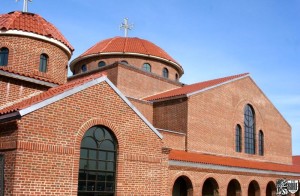 Archdeacon Panteleimon Papadopoulos, director of the Archdiocesan School of Byzantine Music, commented on the support of the community in his remarks when he stated, “I would like to publicly acknowledge the tremendous assistance and support this choir has received from this blessed community. Your presence this evening demonstrates not only your firm support of our choir and its upcoming concert but also your promotion of our ecclesiastical music inasmuch as your youth choir is indeed a jewel in the crown of our Archdiocese. We are proud of the work you have done to keep our children connected to the liturgical life of our church. May the archangels continue to guide and bless this community abundantly.” The evening culminated with both choirs joining their voices and chanting, Ti Epermaho.
Archdeacon Panteleimon Papadopoulos, director of the Archdiocesan School of Byzantine Music, commented on the support of the community in his remarks when he stated, “I would like to publicly acknowledge the tremendous assistance and support this choir has received from this blessed community. Your presence this evening demonstrates not only your firm support of our choir and its upcoming concert but also your promotion of our ecclesiastical music inasmuch as your youth choir is indeed a jewel in the crown of our Archdiocese. We are proud of the work you have done to keep our children connected to the liturgical life of our church. May the archangels continue to guide and bless this community abundantly.” The evening culminated with both choirs joining their voices and chanting, Ti Epermaho.
For more information about this upcoming trip to Constantinople click here.
Read more...Archdiocesan Byzantine Music Concert : Archangels Church Port Washington, NY
Brown Paper Tickets Ticket Widget Loading…
Click Here to visit the Brown Paper Tickets event page.


